|
November 26, 2016 - No. 46
In Memoriam
¡Hasta la
Victoria Siempre,
Fidel!
|

August 13, 1926 –
November 25,
2016
|
|
• Message
from Cuban President Raúl
Castro
• Decree on National Period of Mourning
- Council of State of the Republic of Cuba -
• Press Release Regarding
Nationwide
Tributes to Fidel
- Funeral Organizing Commission -
Events
• Vigils to Honour the Revolutionary
Life and Work of Fidel
Remembering the Life and
Work of Fidel Castro
• Statement of the Canadian Network
on Cuba
• Principles Are Worth More Than
Life Itself
- Fidel Castro, 1994 -
• One Hundred Images of the Cuban
Revolution -- 1953-1996
- Introduction by Abel Prieto -
In
Memoriam
¡Hasta la Victoria Siempre, Fidel!
With deepest sorrow, the
Communist Party of Canada
(Marxist-Leninist) learned that on Friday, November 25, at 10:29
pm, Comrade Fidel Castro Ruz, leader of the ever victorious Cuban
Revolution, passed away.
We send our profound condolences on this very sad
occasion to
Comrade Raúl Castro and the entire Cuban leadership, to all the
Cuban people and their Communist Party and to Comrade Fidel's
family.
Comrade Fidel will live in our hearts in death as he
did in
life, inspiring us to defy all impediments to human and social
progress and to break new ground and reach new heights in all our
endeavours. May the revolutionary spirit, fidelity to principle
and the profound generosity which characterized Fidel's every
action imbue our thoughts on this very sad day.
¡Hasta la
Victoria Siempre!

Message from Cuban President Raúl Castro
Message from the President of Cuba's Councils of State
and
Ministers, Army General Raúl Castro, notifying the Cuban people
and world of the death of the late leader of the Cuban
Revolution, Fidel Castro.
***
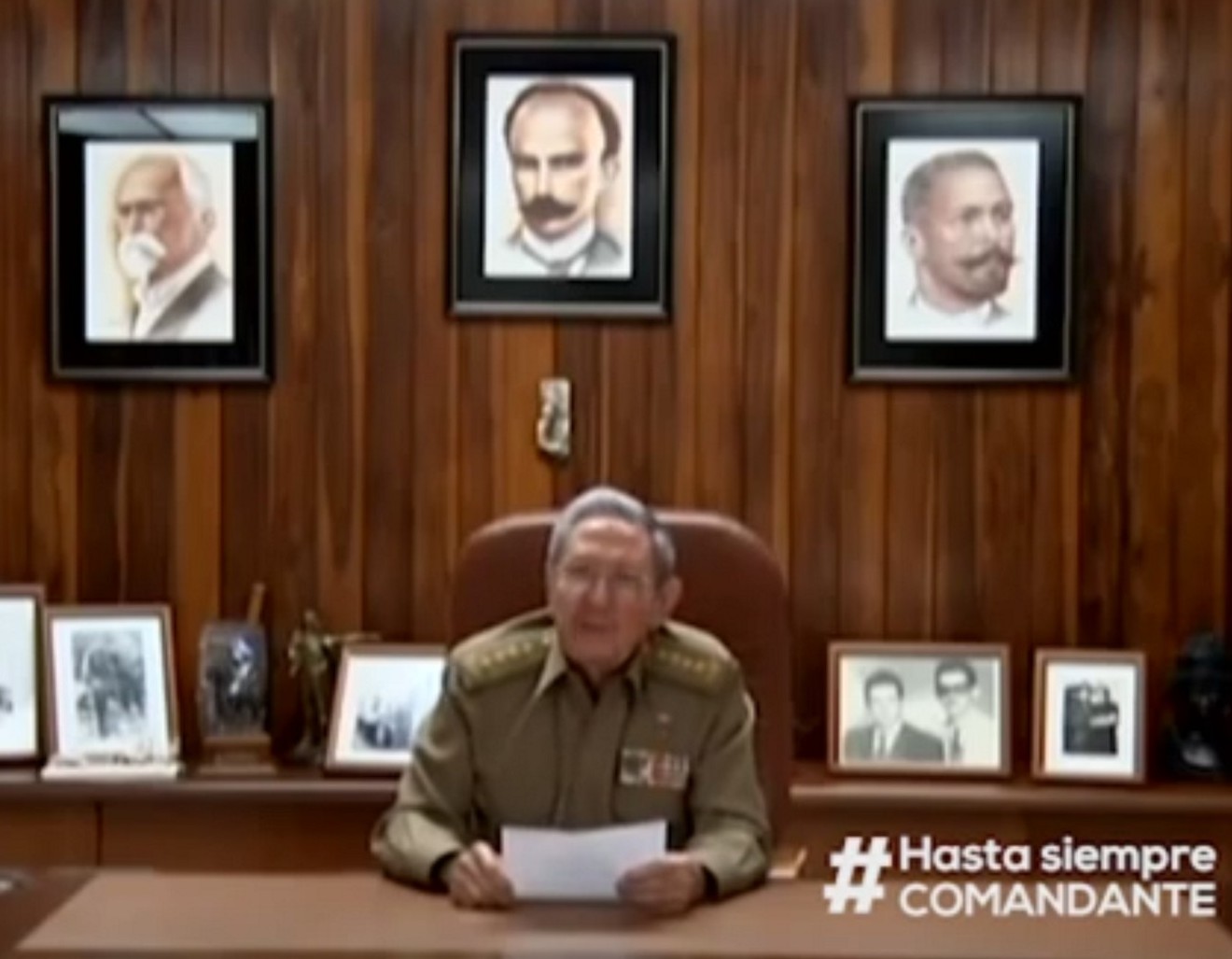 Dear people of Cuba: Dear people of Cuba:
It is with deep sorrow that I come before you to inform
our
people, and friends of Our America and the world, that today,
November 25, at 10.29 pm, Comandante
en Jefe of the Cuban
Revolution Fidel Castro Ruz passed away. In accordance with his
express wishes Compañero Fidel's remains will be cremated. In
the
early hours of the morning of Saturday [November] 26, the funeral
organizing
commission will provide our people with detailed information
regarding the posthumous tributes which will be paid to the
founder of the Cuban Revolution.
¡Hasta la
victoria siempre!

Decree on National Period of Mourning
- Council of State of the Republic of
Cuba -
On the occasion of the passing of Commander in Chief
Fidel
Castro Ruz, the Council of State of the Republic of Cuba declares
nine days of National Mourning, from 06:00 on 26 November to
12:00 on 4 December 2016.
During the Period of National Mourning, all public
activities
and performances will be suspended; the national standard will
fly at half-mast at all public buildings and military
establishments. Cuban Radio and Television will be airing
informative, patriotic and historical programing.

Press Release Regarding
Nationwide Tributes to Fidel
- Funeral Organizing Commission -
The Organizing Commission of the Central Committee of
the
Party, State and Government for the funeral rites of Commander in
Chief Fidel Castro Ruz, informs the populace that as of 28
November, from 09:00 until 22:00, at the José Martí
Memorial,
the
population of the capital may present themselves to pay their
respects in tribute to their leader. The hours will be extended
until 29 November from 9:00 to 12:00.
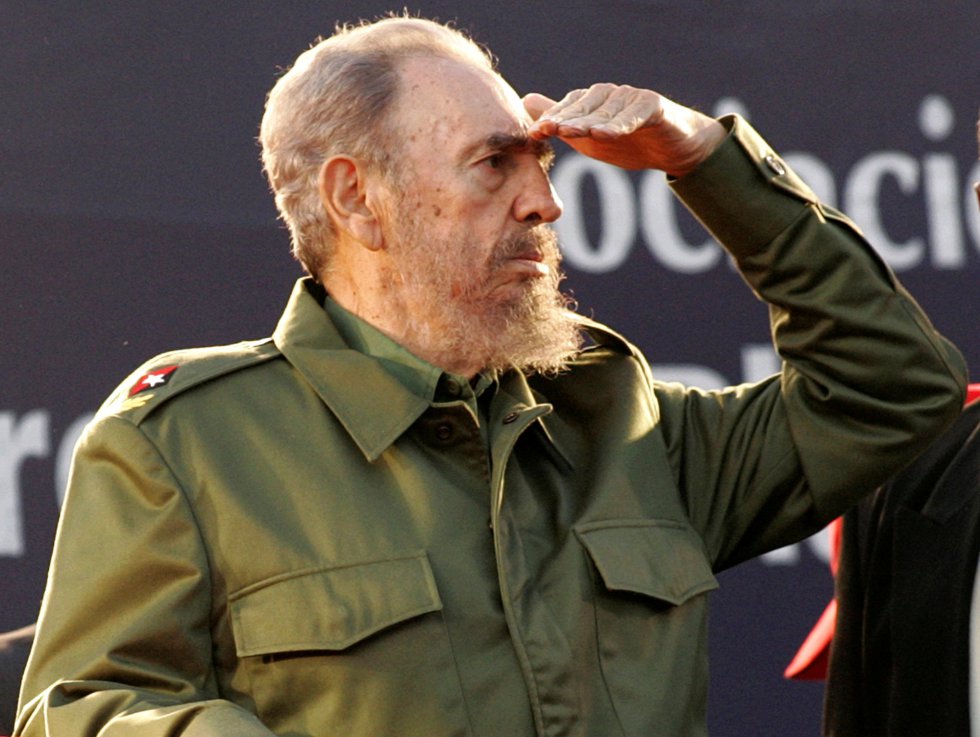 On 28 and 29 November, from 09:00
to 22:00, at
locations to
be notified at the opportune time, in every city and town
including the capital Havana, every Cuban will have the
possibility of paying homage and signing the solemn oath to
fulfill the Concept of Revolution expressed by our historical
leader on the first of May of 2000, as expression of our will to
continue his ideas and those of our Socialism. On 28 and 29 November, from 09:00
to 22:00, at
locations to
be notified at the opportune time, in every city and town
including the capital Havana, every Cuban will have the
possibility of paying homage and signing the solemn oath to
fulfill the Concept of Revolution expressed by our historical
leader on the first of May of 2000, as expression of our will to
continue his ideas and those of our Socialism.
On 29 November, at 19:00, a mass rally will be held in
José
Martí Revolution Square of Havana.
The following day, his ashes will be taken along the
itinerary recalling The Caravan of Freedom of January 1959, to
the province of Santiago de Cuba, to conclude on 3 December.
On 3 December, at 19:00, a mass rally will be held at
Antonio
Maceo Square.
Burial will take place at 07:00 on 4 December at the
Santa
Ifigenia Cemetery.
We also inform our people that the Military Review and
the
March of the Combative People for the 60th anniversary of the
Landing of the Granma Expeditionaries, Revolutionary Armed Forces
Day, will be postponed until 2 January of 2017.

Events
Vigils to Honour the Revolutionary
Life and Work of Fidel
Across the country, vigils have been organized to
honour
Fidel and express the profound solidarity of Canadians with the
Cuban people and their revolution. Join in!
All events Sunday, November 27
Montreal
7:00
pm
Cuban
Consulate,
4546
Boulevard
Décarie
Ottawa
6:00
-
8:00
pm
Embassy
of
the
Republic
of Cuba, 388 Main St.
Toronto
5:00
- 6:30 pm
Cuban
Consulate, 5353 Dundas St. W.
Vancouver
4:00
- 6:00 pm
CBC
Plaza, 700 Hamilton St.

Remembering
the Life and Work of Fidel Castro
Statement of the Canadian Network on Cuba

Fidel in discussion with Five Cuban Heroes shortly after their
return to Cuba, February 28, 2015.
It was with great sorrow and very heavy hearts that the
Canada-Cuba solidarity and friendship movement received the news
of the passing of Fidel Castro, the historic leader of the Cuban
Revolution. The profound sadness that we all feel in Canada is
shared by the progressive, anti-war and social justice forces
across the world.
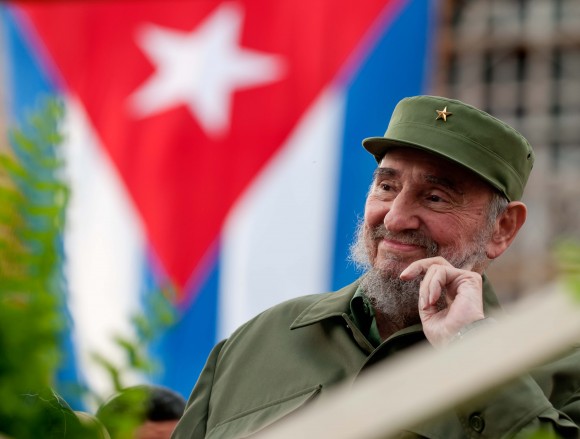 Fidel is an integral member
of the pantheon of champions of
the people who made an indelible contribution to the global
struggle for liberation and emancipation. Fidel is an integral member
of the pantheon of champions of
the people who made an indelible contribution to the global
struggle for liberation and emancipation.
Fidel may be gone, but he lives on. Exemplifying the
finest
traditions of humanity, in the truest sense he belongs to the
world.
While the heart of Fidel may have ceased beating on the
night
of Friday, November 25, his legacy and work continue in the Cuban
Revolution, a living example that a better world is possible.
Fidel's life encapsulated the struggle of the exploited
and
oppressed. The legendary playwright Bertolt Brecht captured this
essence when he wrote: "There are men who struggle for a day and
they are good. There are men who struggle for a year and they are
better. There are men who struggle many years, and they are
better still. But there are those who struggle all their lives:
These are the indispensable ones."

Principles Are Worth More Than Life Itself
- Fidel Castro, 1994 -
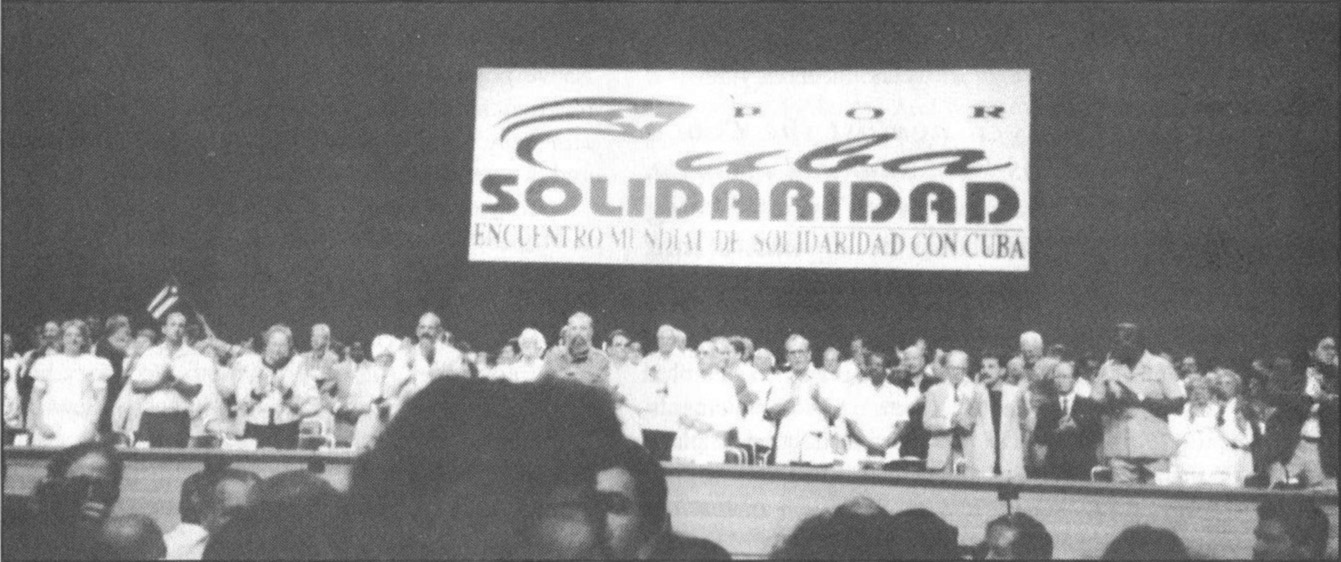
Speech given by
President
Fidel Castro Ruz, first
secretary of the Central Committee of the Communist Party of
Cuba, at the closing session of the World Solidarity with Cuba
Conference, held in the Karl Marx Theatre, on November 25, 1994,
Year 36 of the Revolution.
***
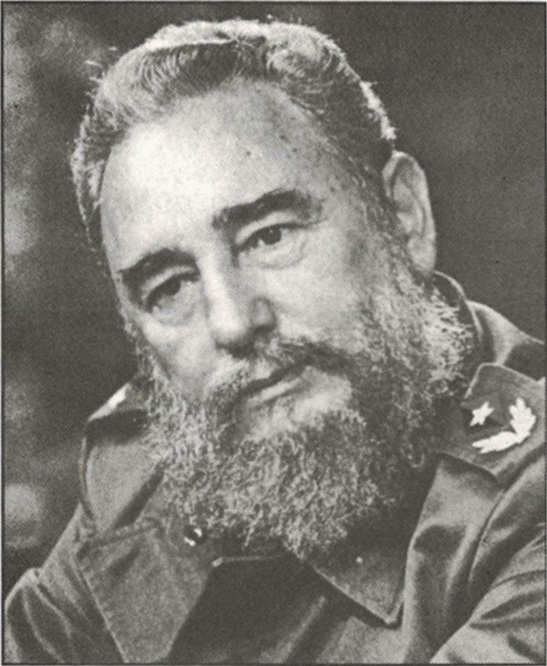 Dear friends, and I say
"dear
friends" with great pleasure! It is difficult to summarize or
make a synthesis of the contents of these conference days, but I
can make some comments. Dear friends, and I say
"dear
friends" with great pleasure! It is difficult to summarize or
make a synthesis of the contents of these conference days, but I
can make some comments.
Throughout the last few days we have heard the best
sentiments and the best ideas of this century, expressed as a
call to battle, you could say. We have discussed many aspects
arising from humanity's concerns over many years. In one way or
another, you have expressed values for which humanity has battled
and fought throughout this century now drawing to a close.
Throughout this conference, you have discussed the
issues
central to the long-fought struggles for independence and against
colonialism, neocolonialism and imperialism -- the fight by the
world's peoples for equality, for justice, for their development,
for their sovereignty, never so threatened as today; the fight
for social justice, the fight against exploitation, the fight
against poverty, the fight against ignorance, the fight against
disease, the fight for all vulnerable and dispossessed peoples;
the fight for dignity, the fight for respect for women; the fight
for unity among all peoples and races; the fight for peace -- all
of these values and many more. Thus we could say that this has
not been just a conference of solidarity with Cuba, and it fills
us with pride that this solidarity has inspired such a
discussion.
The best values of our time have been reflected at this
meeting, and we have also seen the presence of many, though not
all -- for there are so many that they would never fit into 1,000
or 10,000 theatres such as this one -- of the world's finest, most
selfless and altruistic citizens, representatives of humanity's
best. This meeting has been attended by persons with the highest
human and moral sensibility.
I greatly admire humankind's capacity to give, to
sacrifice,
to show generosity, and each time we receive visitors to Cuba, I
observe them, assess them and try to gauge how they are thinking
and feeling. My admiration for so many human values never
ceases.
Absent from this meeting are many, many people whom we
know
as friends, who have demonstrated their solidarity and who have
been examples of sensitivity, solidarity and human generosity.
But those traits remain the indelible, unforgettable impression
that we will take away with us from this conference. How has
this conference unfolded and developed? Everyone I have talked
with has told me it has gone well; it has been unlike many of the
other conferences we have had, where everyone who wanted to speak
did so and the meetings became an interminable series of
speeches, and although this meeting has witnessed many excellent,
brilliant, profound and cogent speeches, an event many days
longer and dedicated to letting everyone speak would not have had
the same quality.
Thus there have been
speeches, statements from the floor,
questions and answers; we have had the working commissions on
various themes; those who did not speak here spoke there, and a
miracle has been worked to allow contributions from hundreds of
people, although it was impossible for everyone to speak.
I think that the people who did speak more or less
expressed
the sentiments of everyone present. For that reason, we have to
congratulate the organizers and leaders of this event, [applause]
since
in
spite
of
differences,
we
have
not
had
a
Tower
of
Babel
situation, and despite language diversity -- 109
countries are represented here, according to the information
given out -- we have understood each other perfectly well,
because, although we have different languages and even different
political opinions, we were unanimous in the noble idea of
solidarity with the Cuban people. [Applause]
The blockade has become the central issue of this
event. Many
people have talked on this subject; comrades have stated that
there is nothing much to add about the blockade. But,
essentially, what is the blockade? The blockade is not only the
prohibition by the United States for any kind of commerce with
our country -- whether it is technology or machinery; whether it
is something more, food; whether it is medicine. The blockade
means that they cannot sell to Cuba even an aspirin to relieve a
headache, or an anti-cancer drug which could save lives or
alleviate the suffering of the terminally ill; nothing,
absolutely nothing can be sold to Cuba!
The blockade is not only the prohibition of all credits
and
finance facilities. The blockade is not only the total closure of
economic, commercial and financial activities by the United
States, the world's richest nation, the most powerful nation of
the world in economic and military terms. It is not only just 90
miles off our coasts, but a few inches away from us, in the
occupied territory of the Guantanamo naval base. The most
powerful imperialist nation is not only close to us, but within
Cuba; and it is not only close to us with its ideas, its
theories, its concepts, its philosophy, but it is also among us
in that minority which unfortunately supports the concepts,
philosophy and ideas they have been disseminating for so many
years throughout the world.
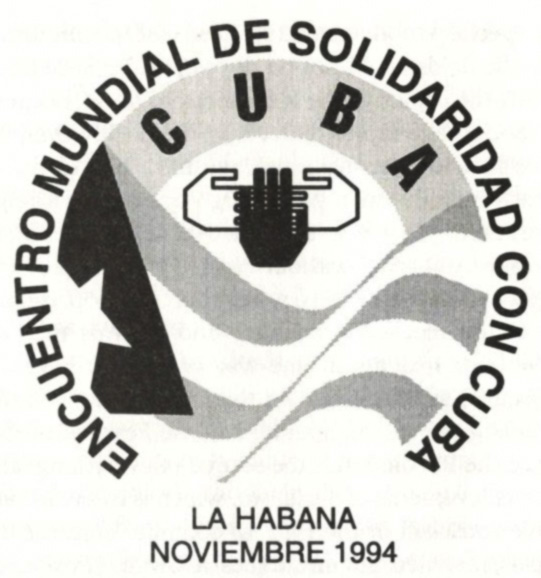 The United States does not trade with markets
that
trade with
Cuba, but it does want to export ideas, and the worst ideas; it
does not export foodstuffs to Cuba, it does not export medicines,
technology or machinery to Cuba, but it does export incredible
quantities of ideas. What is happening now is that before the
ideas market was much wider, and it exported many ideas to the
socialist bloc, to the former Soviet Union and other countries;
these days the United States reserves its counter-revolutionary
ideas for us, from a vast and powerful stock of enormous,
infinite mass media programming. This trade is a one-way trade as
we do not have that kind of mass media, those enormous
communications systems which cost billions, ten of billions of
dollars every year, which we are condemned to receive, not to
exchange. The United States does not trade with markets
that
trade with
Cuba, but it does want to export ideas, and the worst ideas; it
does not export foodstuffs to Cuba, it does not export medicines,
technology or machinery to Cuba, but it does export incredible
quantities of ideas. What is happening now is that before the
ideas market was much wider, and it exported many ideas to the
socialist bloc, to the former Soviet Union and other countries;
these days the United States reserves its counter-revolutionary
ideas for us, from a vast and powerful stock of enormous,
infinite mass media programming. This trade is a one-way trade as
we do not have that kind of mass media, those enormous
communications systems which cost billions, ten of billions of
dollars every year, which we are condemned to receive, not to
exchange.
But the blockade is not only that; the blockade is an
economic war waged against Cuba, an economic war; it is the
tenacious, constant persecution of any Cuban economic deal made
anywhere in the world. The United States actively operates,
through its diplomatic channels, through its embassies, to put
pressure on any country that wishes to trade with Cuba, or any
business interest wishing to make commercial links with or invest
in Cuba, to pressure and punish any boat transporting cargo to
Cuba; it is a universal war, with an immense balance of power in
its favour, against the economy of our country, going to the
extreme of individual moves against persons or individuals who
attempt to undertake any economic activity in relation to our
country.
They euphemistically refer to it as an embargo; we call
it a
blockade, but it is not an embargo or a blockade; it is war! A
war solely and exclusively waged against Cuba and against no
other country in the world.
We have not only had to endure the blockade during the
years
of the Revolution; we have also had to endure incessant hostility
in the political sphere, from attempts to eliminate the
Revolution's leaders, through every known form of subversion and
destabilization, to direct and perennial sabotage of our
economy.
During the last 35 years, we have been the victims of
every
kind of sabotage. I am not just referring to piracy, mercenary
invasion, dirty wars in the mountains and the plains, consistent
and widespread destabilization attempts, but we have also been
the victims of direct sabotage involving explosives and
incendiary devices. Our country has also been subject to
chemical warfare, through the introduction of toxic elements, and
biological warfare via the introduction of plant, animal and
human diseases. There are no weapons or resources that have not
been used against our country and our Revolution by U.S.
authorities and governments.
But you don't have to take my word for it. From time to
time
documents appear, papers that have been declassified after 25
years, although there are others that are kept for 50 or 100
years; some say they hold them back for 200 years, something for
the grandchildren or the great-grandchildren or
great-great-grandchildren of the current generation, who will one
day learn about the barbarities which these "champions" of
freedom, these "champions" of human rights have committed.
The war waged against the Cuban Revolution has been
total and
absolute, and it is not an old war; it is still being maintained,
and plans are being made and carried out to sabotage our economy
and our strategic industries.
Currently, organizations closely linked to the U.S.
government are preparing to attack the Revolution's leaders --
nobody should think that this is a thing of the past, it's going
on right now. They are planning dirty wars, armed mercenary
infiltrations to kill, sabotage, create insecurity and to bring
death to every part of our country. I am saying this in all
seriousness, that such actions against Cuba are being planned by
the United States. This amounts to something more, much more than
an economic blockade.
All these policies come accompanied by an incessant
defamation and slander campaign against our country, as a
justification for their crimes. Now the fundamental emphasis is
being put on the human rights banner; human rights are being
quoted by those people who have committed and are committing all
kinds of atrocities against our country.
As I recently stated to the United Nations High
Commissioner
for Human Rights, with whom I conversed at length, the most
brutal and cruel violation of the human rights of our people is
being committed with the purpose of killing off 11 million Cubans
or bringing them to their knees through hunger and disease!
The United States talking about human rights! They
began by
exterminating their earliest Indigenous or Native population. Who
could forget that period and that tradition of collecting the
scalps of American Indians? They killed more American Indians
than buffalo, and they even finished off the buffalo. [Applause]
They expanded their country at the cost of other
territories;
they extended their country by grabbing land, thus dispossessing
their neighbours, in one way or another, of millions of square
kilometres of land. In terms of Mexico alone, they grabbed over
half of its territory; they still occupy Puerto Rico; they have
wanted to devour Cuba for over 150 years; they have intervened
dozens of times in Latin American countries; they imposed a canal
in Panama. This refers just to our hemisphere. I have not
mentioned the wars in Viet Nam, Laos, Cambodia and in many other
places.
What a history! And what a paradox that they have just
approved Proposition 187 -- this was not 100 years ago, nor 100
days ago, but just a few weeks ago -- to bar health care and
education for undocumented children, for those families living in
what was once Mexican territory. [Applause]
What respect for human rights are shown by these
concepts?
What ideas, what concepts about human beings? It's inconceivable
that a child could fall ill and not be treated, when $300 billion are
spent on the military budget and on the most
sophisticated weapons ever known!
We don't have to look back in history. In contemporary
times,
since the start of the Revolution, what has been the history of
the foreign policy of the United States, that "champion" of
freedom, that "champion" of human rights? A close alliance with
the most repressive and bloody regimes in the world.
If we turn to Europe, we can recall that immediately
after
World War I the United States became the ally of Spanish fascism,
which was supplied with weapons from Hitler and Mussolini and
which cost millions of lives.
We cannot overlook the U.S. alliance with South Viet
Nam and
its genocidal war against the Vietnamese people in the south and
north of that country. We cannot overlook the Korean war, because
Korea was completely demolished, reduced to dust. We cannot
ignore Hiroshima and Nagasaki, and the unnecessary use of nuclear
weapons -- a completely unnecessary use which, in any event, could
have been used against military installations but instead fell on
civilian populations of hundreds of thousands of inhabitants. It
rang in the era of atomic terror in the world.
We cannot forget the alliance with South Africa and
apartheid. Neither can we forget that the apartheid regime built
its own nuclear weapons, and when we were fighting in southern
Angola against the apartheid army, alongside the Angolans, South
Africa already had nuclear weapons, various nuclear weapons! The
United States knew that South Africa had nuclear weapons and that
those nuclear weapons could have been used against Cuban and
Angolan soldiers. Ah! But this was the South Africa of racism and
fascism.
The United States has created a great fuss and has even
threatened war against North Korea, due to its assumption that
the North Koreans were developing nuclear weaponry, but it
tolerated, allowed and indirectly facilitated South Africa's
building of nuclear weapons.
But if we come closer to our continent, and to recent
times,
who could forget the dirty war in Nicaragua, orchestrated via
armed mercenaries, which cost tens of thousands of lives and the
mutilation of thousands and thousands of Nicaraguans? Who could
forget that? [Applause] The "champion" of freedom! The
"champion" of human rights!
Who could forget the dirty war in El Salvador, the U.S.
government support for a genocidal government to which it gave
billions of dollars in sophisticated weapons to trample on the
people's rebellion, a war that caused over 50,000 deaths?
And why did the Malvinas War happen? Simply because the
United States had been using Argentina's 401st special forces
battalion for its dirty war against Nicaragua and El Salvador,
and it provided such exceptional service to the United States
that the battalion felt it could occupy the Malvinas Islands.
This has nothing to do with Argentina's right to the
Malvinas, which we have always defended. [Applause] But
the Argentine military felt that the moment had come to collect
from the United States for services rendered in Central America,
so that the former would back them in their military adventure.
It was an adventure, in fact, because in the final analysis that
is not the way to wage war. You either wage war or you don't. And
if you wage war you take it to its ultimate consequences, if it's
a just war. [Applause] And they invaded the Malvinas
Islands. But when the United States was put into the position of
choosing between its allies and its British forebears, they chose
and backed the British.
Who can forget what has happened in Guatemala since
Arbenz'
government in the '50s, [applause] when a popular
government chosen by the people was trying to carry out agrarian
reform to help campesinos and Indigenous communities? Immediately
the dirty war broke out and they were invaded by mercenaries. And
what has happened since then? What has happened up until now?
Over 100,000 people have disappeared. This is a country where for
decades there were no political prisoners because everyone
disappeared. To this day, who supplies this government, who
trains it, who prepares it? The "champion" of freedom, the
"champion" of human rights. What happened in Chile with Salvador
Allende's government, which had great popular support? [Applause]
They
plotted
against
him,
the
economy
was
blocked
in
many
ways
and
conditions
were
gradually
created
for
a
coup
which
gave
the
country
thousands
and
thousands
of
disappeared persons and murders.
And what happened in Argentina with that military
government
I mentioned? They say at least 15,000 disappeared [the
audience tells him "30,000!"]. I say "at least," because I
don't want people to think I'm exaggerating and yet many say
there were 30,000; and some people here are saying even more. But
let's take my figures as the minimum. Are 15,000 disappeared
really a small amount?
And who provided weapons to this government, who backed
it,
who gave it political support, who made use of their services in
Central America? The "champions" of freedom, the "champions" of
human rights!
And what happened in Uruguay? And what happened in
Brazil?
And who supported the coup leaders and those who tortured and
killed people and made them "disappear"? Who invaded the
Dominican Republic at the time of the Caamano rebellion? [Applause]
Who
invaded
Grenada?
[Applause]
Who
invaded Panama? [Applause] The "champions" of freedom
and human rights!
Which of those governments was harassed? Which of the
governments I named have been blockaded? Which of them have been
denied credit and trade? Which was denied the purchase of weapons
and war materiel? Who didn't they train in so-called
antisubversive action? Who didn't they train in the arts of
crime, disappearances and torture? And these are the ones who
blockade Cuba, who slander Cuba, who accuse Cuba of human rights
violations to justify their crimes against our people.
And I can say dispassionately, without being
subjective, that
Cuba is the country that has done the most for human beings. [Prolonged
applause
and
shouts]
What revolution was more noble? What revolution was
more
generous? What revolution showed most respect for people? And I'm
not only talking about a victorious revolution in power, but
since the time of our own war, of our own revolutionary struggle,
which established inviolable principles, because what made us
revolutionaries was rejection of injustice, the rejection of
crime and the rejection of torture. During the 25 months that our
intense war lasted, in which we captured thousands of prisoners,
there was not one case of physical violence to obtain
information, not even in the midst of the war [applause];
there was not one case of killing a prisoner. What we would do
with prisoners is set them free -- we would keep their weapons,
which was all we were interested in, and we treated these arms
suppliers with all the consideration they deserved [laughter
and applause]. At first they had been led to believe that we
would kill them all, and in fact they would resist up to the
bitter end. But when they discovered during the course of the war
the true behaviour of the Rebel Army, they would give up their
weapons with less of a struggle when they were surrounded, when
they knew they had lost. Some of those soldiers surrendered three
times, because they were switched from one front to the other and
they were used to surrendering, they had experience. [Laughter and
applause]
But the most important thing is that the Cuban
Revolution has
maintained the principles of never resorting to torture, of never
stooping to crime, without exception to this day [applause],
no matter what they say, no matter what
they
write. We know that a lot of this slander has been written by
people in the CIA's pay.
Are there many other examples like it in history? In
the
world's history there have been many revolutions and in general
they were rough, very rough: England's civil wars, the French
Revolution, the Russian Revolution, the Spanish Civil War and the
Mexican Revolution. We know quite a bit about revolutions and
many books have been written about them and about
counterrevolutions. Well, one does not even speak of
counterrevolutions. Revolutions tend to be generous and
counterrevolutions are unfailingly merciless. Just ask the
members of the Paris Commune. [Applause]
In the case of Cuba there has not been one exception.
In the
whole history of the Revolution, there has not been one single
case of torture -- and I mean that literally -- not one political
murder, not one disappearance. In our country we do not have the
so-called death squads that sprout like mushrooms in this
hemisphere's countries. [Audience names several countries] You
speak for us! [Applause] We prefer not to mention
names, but everything has happened in our hemisphere.
Why is there no mention made of the United States,
where
people have been brutally murdered for defending civil rights,
men like Martín Luther King and many others, a country where as
a
rule only blacks and Hispanics are given the death sentence?
Our country does not have the phenomena we see in
others,
such as children murdered on the streets allegedly to avoid the
spectacle of begging and apparently to fight crime. The
Revolution eradicated begging, the Revolution eliminated
gambling, the Revolution eliminated drugs, the Revolution did
away with prostitution.
Yes, unfortunately there can be some cases or
tendencies that
due to the economic difficulties, and the opening to numerous
outside contacts encourages some "jineteras". We do not deny
this, and from time to time some may turn up on 5th Avenue, but
one should not confuse decent people with jineteras. [Applause]
Such
cases
exist
but
we
fight
against
it.
We
do
not
tolerate
prostitution;
we
do
not
legalize
prostitution.
[Applause]
There may be some children, encouraged by their
parents, who
approach tourists and ask them for gum or something else; these
are phenomena that we experience due to the special situation
that we are living in, at a time of great economic difficulties
as the blockade has been strengthened. But these things were not
known during the normal times of the Revolution.
You won't see people sleeping in doorways, covered with
newspapers, regardless of our present poverty. There is not a
single human being abandoned or without social security,
regardless of our present great poverty. [Applause] The
vices we see every day in capitalist societies do not exist in
our country. This is an achievement of the Revolution.
There is not one child without a school or a teacher,
there
is not one single citizen who does not receive medical care,
starting before birth. Here we start medical care for our
citizens when they are still in their mothers' wombs, right from
the first weeks after conception. [Applause]
We are the country in the world with the most doctors
per
capita, regardless of the special period, [applause] and
I'm not only referring to the Third World, but to the whole
world! More than the Scandinavians, more than the Canadians and
all those who are at the top rankings in public health. By
reducing infant mortality from sixty to ten per 1,000 live births
and with other paediatric programs, the Revolution has saved the
lives of more than 300,000 children.
We have the most teachers per capita in the world, [applause]
regardless
of
the
hardships
we
suffer;
we
have
the
most
art
teachers
per
capita
in
the
world;
we
are
the
country
with
the
most
physical
education
and
sports teachers per capita. [Applause]
That is the country that is being blockaded, that is
the
country that they are trying to bring to its knees through hunger
and disease.
Some demand that, in order for them to lift the
blockade, we
must surrender, we must renounce our political principles, we
must renounce socialism and our democratic forms. [Shouts of
"No!" "Never!"]
Furthermore, quite a confusing document was issued at
the Rio
Conference, despite the noble efforts against it by countries
like Brazil, Mexico and others. It was supported by some
countries that were very, very hand-in-glove with the United
States; I don't want to mention any names. It is a document with
a certain degree of confusion which leaves room for erroneous
interpretations, and some interpret it as supporting the U.S.
position of conditioning the blockade's suspension on Cuba making
political changes.
Political changes? Is there a country that has made
more
political changes than we have? What is a Revolution, if it's not
the most profound and extraordinary of political changes? [Applause]
We
made
this
Revolution
over
35
years
ago,
and
during
those
35
years
we
have
been
carrying
out
political
changes,
not
in
search
of
a
formal,
alienating
democracy which
divides peoples and splits them up, but rather a democracy that
really unites peoples and gives viability to what is most
important and essential, which is public participation in
fundamental issues. [Applause] Furthermore, we recently
made modifications to the Constitution, based on the principle
that the people nominate and the people elect. [Applause]
I'm not criticizing anybody, but nearly all over the
world,
including Africa, they are introducing Western political systems,
together with neoliberalism and neocolonialism and all those
other things, [to] people who have never heard of Voltaire, Danton,
Jean-Jacques Rousseau, nor the philosophers of U.S. independence -- and
remember that Bolivar in our own hemisphere was very much
against the mechanical copying of the European and U.S. systems,
which have brought catastrophe, division, subordination and
neocolonialism to our countries. We can see societies splitting
into thousands of pieces, societies that should be united in
their efforts to develop have ended up not only with a multiparty
system but with hundreds and even thousands of parties.
We have worked, we've developed our own system, which
we did
not copy from anyone. We established the principle that those who
nominate in the first instance are the residents. One may or may
not agree, but it is as respectable as the Greek democracy that
people talk so much about and without slaves or serfs. Because
Greek democracy consisted of just a few that would meet in the
plaza, and they had to be few, because in those days they did not
have microphones, and they would get together to have an election
right there. [Laughter and applause] Neither the slaves
nor the serfs participated, nor do they today.
When you analyze the electoral results in the United
States
you discover that they have just elected a new Congress, where
undoubtedly there are worrying tendencies toward conservatism and
the extreme right, but those are internal matters in the United
States. The truth of the matter is, I can assure you, I promise
you, we have not made it a condition that the United States
renounce its system in order to normalize relations. [Laughter and
applause] Just imagine if we told them
that
they had to have at least 80 per cent of the electorate voting.
Thirty-eight per cent decided to vote and the rest said, "I'm
going to the beach," or "I'm going to the movies," [Laughter]
or "I'm going home to rest." This is what
happened to the "champions" of freedom, human rights and civil
rights. [Applause]
It is very much the same in many countries of Latin
America.
Many people don't even vote. The slaves and the servants say:
"What am I going to vote for, if I'm still going to be just the
same?"
How difficult it is for us to come to an agreement!
Because
it's certain that the influence of the mass media is greater all
the time and the series of obstacles that the popular forces have
to overcome are increasingly difficult.
However, 95 per cent of Cuban citizens vote in our
elections
and nobody forces them to vote. Even those who are not with the
Revolution go and vote, although they may turn in a blank ballot,
so as not to vote for this one or for the other; or they vote for
one or they vote for the other.
Right now, in our nation, I repeat once again, the
local
residents nominate the candidates, the people nominate the
candidates and the people elect them. In this way, the
possibilities of any citizen being elected are infinitely greater
than in any other country. One good example: I was talking with a
Mexican delegation and they said to me: "The youngest of our
deputies was here." "How old is he?" They told me: "Twenty-five
years old." I was really astounded, but then I suddenly
remembered that we have a number of deputies under the age of 20,
because the students, from secondary school onwards, take part in
the process of selecting candidates, as do all the mass
organizations. [Applause].
The campesinos take part in the process of selecting
candidates; the women's organization takes part in the process of
selecting candidates; the trade unions take part in the process
of selecting candidates; the Committees for the Defense of the
Revolution take part in the process of selecting candidates and
there are numerous students who are deputies to the National
Assembly and women, campesinos, workers and intellectuals, from
all sectors. It isn't the Party that puts up the candidates. The
Party does not put up the candidates nor does it elect them. It
oversees the elections to make sure that all of the principles
and the rules are observed; but it does not take part in any of
these electoral processes. That is the situation in our
country.
In one of the most recent modifications made in the
electoral
process, a candidate has to win more than 50 per cent of the valid
votes to become a deputy.
[Ricardo] Alarcón was explaining some of these
things, when he
recalled, with a magazine that he had in his hand -- he has the
advantage of speaking English and he reads a U.S. magazine now
and again [laughter] -- how one man had spent $25 million in a
campaign to become a member of the U.S. Congress.
What kind of democracy is that? How many people have $25 million to
spend on a campaign? And in Cuba candidates don't even
need to spend $25, although any citizen might have to pay
the bus fare to go and vote on the day of the elections. [Applause]
What kind of democracy is it that requires one to be a
millionaire to be able to have all the resources with which to
speak and persuade the people to vote for you, and then the
candidate doesn't remember those who voted for him until the next
elections four or five years later; he doesn't think about them
ever again; he forgets them.
In our country people can be removed from their posts,
and
the same applies to a municipal delegate as well as the highest
official. Anyone can be elected, but they can also be dismissed
from those posts. That is our system, which we don't expect all
the other countries to apply; it would be absurd to try to make
it a model; but it is the system that we have adopted; nobody
imposed it on us, no U.S. governor or supervisor came here to
establish an electoral code as they did before.
We drew up the Constitution ourselves, [applause]
we
drew
up
the
electoral
code
ourselves,
we
have
planned
the
system
ourselves
and
we
have
developed
it
ourselves,
which
is
what
you
have
been
defending:
the
right of a country to establish the
regulations, the economic, political and social system that it
considers to be appropriate. Anything else in the world is
impossible, anything else is absurd, any other aim is insane and
these lunatics go around trying to get everyone to do exactly the
same as them, and we don't like their way of doing things. [Applause]
That is why for us the question of ending the blockade
in
exchange for political concessions, concessions that correspond
to the sovereignty of our country, is unacceptable. It is
absolutely unacceptable, it is outrageous, it is exasperating and
really, we would rather perish than give up our sovereignty. [Prolonged
applause]
We have had the blockade for many years; however, it is
necessary to think about one fact: there was one world when the
Revolution triumphed; today, 35 years later, there is another
world. The world changed and didn't progress, it retrogressed,
because the bipolar world wasn't to anyone's liking, but the
unipolar world is much less to our liking.
When the Revolution triumphed, there was a bipolar
world. The
United States imposed the blockade on us from almost the first
moments. It began by doing away with the sugar markets, and it
cut off our supply of fuel. Imagine the new Revolution in those
circumstances! Of course they cut off our supply of machinery, of
spare parts, of everything, but there was the USSR and the
socialist bloc.
That was lucky for us, because faced with the U.S.
blockade,
90 miles away, there was another power in the world, another
movement in the world which had a revolutionary origin and which
was at odds with U.S. imperialism. Thanks to that movement we
could find markets for our sugar, supplies of oil, raw materials,
food, many things. That was explained here.
We were paid preferential prices; however, it is
necessary to
say that not only Cuba was paid preferential prices. The Lomé
Convention established preferential prices for sugar and other
products for many countries which were ex-colonies. In the United
States itself, when it was a major sugar market, there were also
preferential prices, before they snatched away our quota and
redistributed it throughout Latin America and other parts of the world.
Eighty per cent of the sugar in the world is traded through
preferential prices. And very much in accordance
with the principles of their political doctrine, the socialist
countries paid us preferential prices.
That was the policy which we defended for all of the
countries of the Third World, because it was the only way of
reducing the great difference that existed between the developed
countries and the underdeveloped countries. It was a demand of
the world, it was a demand of all the countries of the Third
World. And even so it was mutually advantageous, because although
they paid us preferential prices, it cost more to produce sugar
in the Soviet Union than the prices they paid us for sugar. But
at any rate, we benefited from those preferential prices, and we
used the money to purchase fuel, raw materials and many
things.
In our situation it so happened that the USSR and the
socialist bloc collapsed and the blockade got stronger. As long
as the socialist bloc and the USSR existed we managed better, we
could endure the difficulties. Our economy even grew under those
conditions throughout nearly 30 years and attained an
extraordinary social development.
However, it was in that world that the Cuban Revolution
was
born. There was no other, there were no other alternatives, in
the midst of the country being blockaded by the most powerful
country in the world. That is why the disappearance of the
socialist bloc and the USSR was such a terrible blow for us,
given that the existing blockade was not only maintained but was
also strengthened. For that reason our country lost 70 per cent of
our imports, and I wonder if any other country in the world would
have been able to withstand a similar blow, and I wonder how many
days they would have been able to withstand it -- a week, two
weeks or a month. [Applause] How would we have been able
to if it hadn't been for the people's support for the Revolution?
How would we be able to withstand it without our political
system, without our democratic system, without the people's
direct participation in all of the fundamental issues, which is
true democracy? [Applause]
Which other Latin American country could have been able
to
withstand the abrupt 70 per cent drop in imports? Would any
European country have been able to endure a similar trial? The
politicians would have abandoned their principles and capitulated
in an instant; but we have dignity, we have a sense of honour and
we stick to our principles. [Applause] For us these
principles are worth more than life itself and we have never sold
out our principles, never! [Applause]
When we helped the Central American revolutionaries,
the
United States said that they would remove the blockade if we
stopped helping them, and nothing of the kind ever crossed our
minds. [Applause] On other occasions they said that they
would be prepared to remove the blockade if we stopped helping
Angola and other African countries, and the idea of selling out
our relations with other countries never crossed our minds. On
other occasions, they said they would remove the blockade if we
broke off our links with the Soviet Union, and it never occurred
to us to do anything of the kind, because we are not a party or a
political leadership that sells out its principles. The blockade
will never end at that price, because it is a price that we are
not prepared to pay.
That situation led us to the special period.
We had been working on some excellent programs before
the
socialist catastrophe, excellent programs in all fields; we were
carrying out a process of rectification of errors and negative
tendencies, of old errors and new errors, of old tendencies and
new tendencies, and we were working very intensely when that
debacle led us into what we could call a double blockade, because
as soon as the breakup of the socialist bloc and the breakup of
the USSR occurred and even before the breakup of the USSR, the
United States was strongly pressuring those countries to stop
trading with Cuba, and when the USSR finally disintegrated, the
United States put on extreme pressure, and not without success,
to cut off trade and economic relations between the countries of
the old socialist bloc, the USSR and Cuba.
So our country found itself enveloped in a double
blockade
and, nevertheless, we had to save the nation, we had to save the
Revolution and we had to save socialism -- we talk about saving
the gains of socialism, because we can't say at this time that we
are building socialism, but rather that we are defending what we
have done, we are defending our achievements. This is a
fundamental objective in a world that has changed in such a
radical way, in which all the power of the United States has been
turned against us; because, for example, they don't impose
conditions on China, a huge country, an immense country, which
defends the ideas of socialism; they don't impose conditions on
Viet Nam, a marvellous and heroic country. Today there is no
blockade against them, but there is a blockade against us. Put
yourselves in the place of our Party and our government. And in
these such difficult conditions that have never existed before,
we must save the nation, save the Revolution and save the
achievements of socialism.
What measures would it be necessary to take in this
world
which exists today and which, of course, won't always exist?
Those are illusions held by those who believe that neoliberalism
is already the nec plus ultra, that it is the be-all and
end-all for capitalism; these are illusions that they have. [Applause]
The
world
will
teach
us
many
lessons.
What
is
going
to
happen
with
all
of
this
would
take
a
long
time
to
explain,
and
would
be
much
too long for us to bring up now, but
for them it's never-ending.
Now they talk about the globalization of the economy.
We'll
see what is left from this globalization for the countries of the
Third World, with the disappearance of all the current defense
mechanisms of the Third World, which must compete with the
technology and the immense development of the industrialized
capitalist countries. Now the industrialized countries will try
more than ever to exploit the natural resources and the cheap
work force of the Third World, to accumulate more and more
capital. However, it is superdeveloped capitalism, like in
Europe, for example, that has more unemployed people all the
time, and the more development, the more unemployed there are.
What will happen with our countries? There will be a
globalization of the differences, of the social injustice, the
globalization of poverty.
However, this is the world we've got, with which we
must
trade and exchange our products, in which we have to survive.
That is why we must adapt to that world and adopt those measures
which we consider essential, with a very clear objective.
This is not to say that everything that we are doing is
solely the result of the new situation. We have made changes as
we go along, and even the idea of introducing foreign capital
came up before the special period: we had realized that specific
areas, specific fields could not be developed because there
wasn't the capital or the technology to do so, because the
socialist countries didn't have them. However, we have had to
open up more, we have had to create what we could call a pretty
large opening to foreign investment. That was explained here: in
Cuba's circumstances today, without capital, without technology
and without markets, we couldn't develop. Hence, all of the
measures, changes and reforms that we have been making, in one
way or another have the objective, as was stated in this
conference, of safeguarding our independence and the Revolution,
because the Revolution is the source of everything, and the
achievements of socialism, which is to say to preserve socialism
or the right to continue constructing socialism when
circumstances allow it. [Prolonged applause]
We are making changes, but without giving up our
independence
and sovereignty; [applause] we are making changes, but
without giving up the real principle of a government of the
people, by the people and for the people, that, translated into
revolutionary language, is the government of the workers, by the
workers and for the workers. [Prolonged applause and shouts
of "Fidel, Fidel!"] It's not a government of the
bourgeoisie, by the bourgeoisie and for the bourgeoisie; nor a
government of the capitalists, by the capitalists and for the
capitalists; nor a government of the transnationals, by the
transnationals and for the transnationals; nor a government of
the imperialists, by the imperialists and for the imperialists. [Applause]
That is the big difference, whatever changes and
reforms we
carry out. If some day we renounced all this, we would be
renouncing the lifeblood of the Revolution.
We have shown solidarity with the world; it's not our
task
now to talk about this solidarity. As far as our solidarity is
concerned, we should do the most and talk the least, because
we're not going to make any apology for our conduct.
A few minutes ago, before starting the final part of
this
event, a comrade said: "Look at how many things Cuba has done!
When visitors from one country or another talk, when they talk
about doctors, students, people that were trained here, in one
activity or another, it is clear that in these years our country
has carried out many things. For us, solidarity and
internationalism are a matter of principle, and a sacred one at
that." [Applause]
To provide an example, I'm going to give a few
statistics.
More than 15,000 Cuban doctors have given free services in dozens
of countries in these years of the Revolution, more than 15,000
doctors have fulfilled internationalist missions as doctors; [applause]
more
than
26,000
teachers
and
professors.
I
ask
if
any
other
small
country,
and
even
medium
or
big
countries,
has
had
this
record.
Suffice it to say that at one point we had three times
more
doctors working for free in the Third World than did the World
Health Organization, [applause] and we didn't have a lot
of resources either, only minimum resources. We only had the
honour of our health workers, with their internationalist
calling. How many lives have they saved? And I wonder, is it fair
to blockade a country that has done this? [Shouts of
"No!"]
How many hundreds of thousands of children have we
educated
with our teachers in foreign countries? And we haven't only sent
primary and secondary school teachers, but university professors;
we have founded medical schools in diverse countries of the
world. Is it fair to blockade a country that has done all this,
and still does it to a certain degree? Half a million Cubans have
completed internationalist missions of different types, half a
million Cubans! [Applause]
The Africans have been very generous, very noble, and
have
wanted to recall here Cuba's solidarity and aid in the war
against colonialism, the war against foreign aggression, the war
against apartheid and racism.
Like I said here, our soldiers were fighting in
southern
Angola, 40,000 men, 40,000 men! [Applause] They were
fighting alongside the Angolan troops, who acted and fought
heroically. There were Cubans in southern Angola facing up to the
South Africans after the battle of Cuito Cuanavale, and when our
counter-offensive was launched in southwest Angola, these men
were exposed to the possibility of nuclear warfare. We knew it,
and the distribution of forces in that offensive took into
account the possibility that the enemy could use nuclear
weapons.
At one point we had 25,000 foreign students in our
universities. [Applause] Cuba was the country with more
scholarships per capita than anywhere else in the world, and we
didn't brag about it; we just went on our way, fulfilling the
task of education as Martí taught us, and we did what we could
for other countries.
I think that this extraordinary conference, your noble,
generous words of solidarity reflect in part the history of our
own Revolution's solidarity. [Applause] This has greatly
encouraged us and gives us the strength to keep going.
There are a lot of choices in this day and age: the
choice of
freedom, the choice of sovereignty, the choice of independence,
and the choice of social justice.
Social justice is acquiring such force as an idea -- in
the
midst of neoliberalism, which is the negation of every principle
of justice -- that even some international agencies talk about it.
The Inter-American Development Bank talks more and more about the
need for social justice in this hemisphere. Even the World Bank
is talking about social justice! They're the champions of
neoliberalism and they talk about social justice, because they
realize that the differences are so great and are still growing,
and they would like to make the dream of neoliberalism come true,
of capitalism with social justice. They're afraid that misery,
hunger and poverty will undermine the bases of the neoliberalism
that they praise so much, and that is why they talk about social
justice.
But we know that only the people can achieve social
justice,
and that neoliberalism and social justice are incompatible,
they're irreconcilable; [applause] that a superdeveloped
world next to an underdeveloped world is incompatible,
irreconcilable. We know that the former will get richer and
richer, while the latter will get poorer and poorer, and this is
an irrefutable reality.
Your presence here shows that just ideas live on, that
noble
ideas live on, that values live on. And we have to multiply these
ideas and values just like Jesus Christ multiplied the loaves and
fishes. [Applause] The church talks about giving
opportunities to the poor, and this seems excellent to us, but I
think that today's world needs more than choices: it needs
energetic, tenacious and consistent struggle by the poor
themselves. [Applause and shouts of "Fidel, Fidel!"] I
should have said "churches"instead of "the church," considering
that we're not only talking about the Catholic church.
We must wage an unending battle against the causes of
poverty, [applause] an inexorable offensive against
capitalism, against neoliberalism, against imperialism, [applause]
until
the
day
when
we
can
no
longer
speak
of
billions
of
human
beings
who
are
hungry,
who
don't
have
schools,
hospitals,
a
roof
over
their
head,
or even the most elemental
means of living.
This planet is getting close to having six billion
inhabitants; in one century the population has increased
fourfold. The threats that humanity suffers today are multiple,
not only social, but economic, political and military.
Someone here was saying that nowadays they call wars
"humanitarian missions" or "peace operations." Wars threaten us from
all sides, interventions
threaten us from all sides; but the world is also being
threatened by destruction of the natural conditions for life, the
destruction of the environment, a problem which is getting more
and more attention and increasingly moves the conscience of
humanity. We will have to make a huge effort in every sense of
the word to save humanity from all these risks.
And what is the historical origin of this situation?
Could
anyone deny that it was colonialism, neocolonialism and
imperialism? Could anyone deny that it was capitalism? We are
very conscious of all this, despite the setbacks suffered by the
progressive movement, the revolutionary movement and the socialist
movement.
But we'll say it here and now, dear friends. We will
never
return to capitalism! [Applause] Not to savage
capitalism -- or as Perez Esquivel likes to call it, cannibal
capitalism -- or to moderate capitalism, if this exists; we don't
want to go back, and we won't go back! [Applause]
We know what our duties and obligations are. We've
withstood
almost five hard years already, when others thought the Cuban
Revolution would quickly disappear off the face of the earth. We're
working persistently and harder all the time, and even
putting more and more emphasis on the subjective, on our own
errors, our own deficiencies; emphasizing the subjective so that
the objective doesn't become a pretext for deficiencies.
We've still got to raise the consciousness of our
people. We
still have to explain why we need to reduce the excess currency
in circulation and the methods used to continue gathering up the
excess without using shock therapy; we have to look for
efficiency in agriculture and industry.
I know that the issue about food production has been a
worry
of yours, expressed here. I must say that we are obliged to
produce food without fertilizers, without pesticides, without
weedkillers, often without fuel, resorting to animal traction,
faced with the need to feed the 80 per cent of the population
living in urban zones. Cuba, unlike Viet Nam or China, has only
20 per cent of the population in the countryside and 80 per cent in
the cities. They have the inverse, 75 to 80 per cent in the
countryside and 20 to 25 per cent in the cities.
We even have a labour shortage in rural areas. Our
agriculture and sugar industry had been mechanized, like many
other sectors of the economy. Someone asked whether we should
produce sugar or not. We don't have any other choice than to
produce sugar, we have to produce it; now, it has become more
expensive for the sugar mills and machines to produce less
because of a lack of fertilizer and irrigation, for example. In
general, we know how to produce food, but we've had to deal with
a great scarcity of supplies for food production.
We've had to develop other areas. Tourism has already
been
mentioned here. It has become a necessity, although it wasn't
promoted in the first years of the Revolution, because it has its
good side and its bad side. And since we can't live with the hope
of being in an ivory tower, we have to get mixed up with the
problems of this world. And, based on the idea that virtue is
born of the struggle against vice, just as magnificent flowers
bloom from cow dung, [applause] we have to get used to
living with all these types of problems. We have to look for
resources in convertible currency to make these supplies
available.
The livestock has been left without feed, without
irrigated
land, without fuel.
The problems we've had to deal with aren't easy, but
we're handling it, sharing the little we have among many, rather than a
lot among a few. [Applause]
We've
been
sharing
what
we
have.
And
then,
under
these
incredibly
difficult
conditions
--
I
repeat,
there
is
not
a
single
school without a teacher, not a child without a
school, not a patient without a doctor or hospital; we maintain
social security, we maintain our cultural development, the
development of sports; we even came in fifth place in the Olympic
Games in the midst of the special period. [Applause]
This gives you an idea of our strength in exceptionally difficult
conditions.
Therefore, when we share the little we have among
everyone, a
lot of things can be done, and there are many countries in the
world that have much more than we do and do very few things. [Applause]
This event concludes, really, like an unforgettable
lesson
for all of us, and we hope for a lot, we hope for so much from
this battle that you propose to fight shoulder to shoulder with
us to end the blockade, to end the hostility against our country,
to defend hope. Not because we have been predestined to be
anyone's hope. We don't consider ourselves a people bound by
destiny; we constitute a small people, a modest people, to whom
history has in these particular circumstances assigned the role
of what we're defending: our most sacred ideals, our most sacred
rights. You all see this as hope.
We understand what it would mean for all the
progressive
forces, for all the revolutionary forces, for all lovers of peace
and justice in the world if the United States succeeded in
crushing the Cuban Revolution, and because of this we consider
defending the Revolution along with you to be our most sacred
duty, even at the cost of death.
Thank you, thank you very much, a million thank yous. [Applause]
And let me exclaim one more time:
Socialism or Death!
Patria o Muerte! Venceremos!
Long Live Solidarity!
[Shouts of "Long Live Solidarity!"]
[Ovation]

One Hundred Images of the Cuban Revolution -- 1953-1996
- Introduction by Abel Prieto -
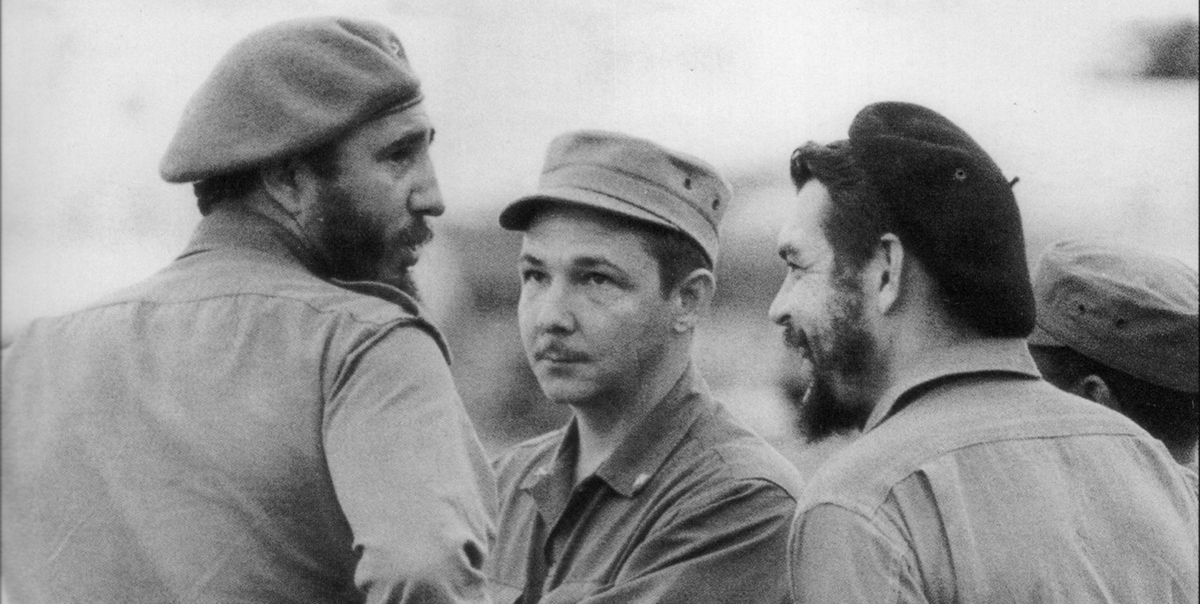
Fidel and Raúl Castro and Che Guevara in photo which appears on
cover of
Cien Imagenes de
la Revolucion Cubana
This gallery opens with a shot of concentrated
intensity:
August 1, 1953 a young Fidel Castro appears in La Vivac [prison]
in Santiago de Cuba, and behind him on the wall, in an
inexplicable coincidence that his jailers were unable to avoid,
looms the face of Martí. The last photo, dated May 1, 1996,
captures the crowd in Revolution Square in Havana through a ray of
light, as if the contained energy of the initial image had burst out
and was being manifested in that public space.
|
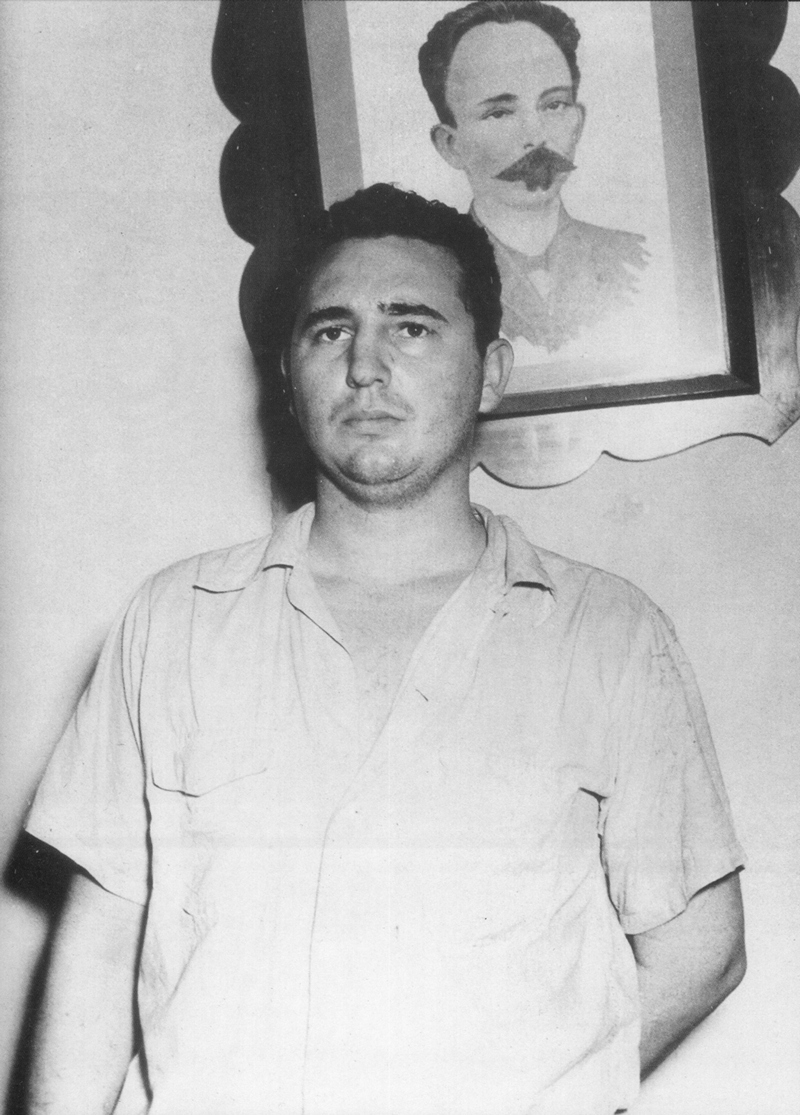
Fidel Castro, Vivac Prison, 1953
|
Altogether the photos cover four decades in which
the
history of Cuba seems to intensify and move at a faster pace, with
symbols and legends marking every moment: four decades in which
Cubans have given themselves body and soul, without any pettiness, to
an
adventure of transformation, combat and
creation, where the personal route of each has become
incorporated into the collective journey, and they have faced the
impossible without fear, over and over again, conquered their
many demons and put into that hard, heady and full life, that
unique life, the very best of themselves.
In January 1960 Nicolás Guillén confessed
to being perplexed
by the curious quality that time took on in that first year of
the victorious Revolution: '59 passed "as fast as lightning," but
was made up of "pregnant" and "compact" days. In just twelve months
there
was
something substantial that had changed in the air, on the land
of the island, and especially in its people: "We are witnessing
the birth of a new sensibility, rooted in an uncommon conception
of civic duty" the poet tells us, and it is a sensibility that is
manifested in another way of practicing cubanía, of
understanding patriotism, of engaging in private and public
honesty.
The people who we discover in these pictures, in the
trenches, in the harvest, in volunteer work, in marches and
rallies, bring with them (and it is a hidden privilege that
the photographers managed to capture) a very precise,
well-defined consciousness of the significance of their actions,
of the greater coherence that individuals, their ideals and their
works, take on when a true Revolution is undertaken. They are
radically changing the destiny of an island that seemed doomed to
debasement and disintegration, and at the same time they
understand that it involves a major war, a duel with the
impossible that goes beyond the island's borders. "Every man,"
points out Nicholás, "every woman and even every child knows
what
they have in their hands and is of no mind to let it be snatched from
them."[1]
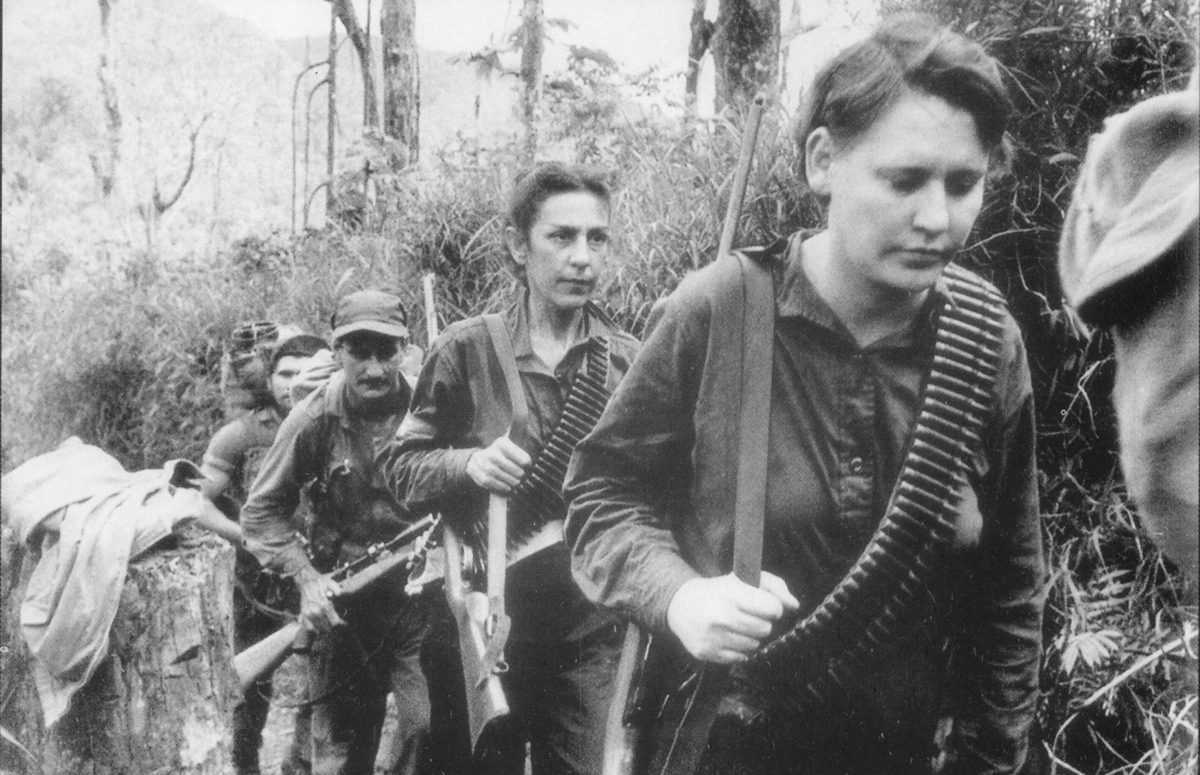
A curious synthesis between political commitment and
other
areas of humanity are externalized in many of the photos that comprise
our gallery: the protagonists of these images show themselves in
their multiple dimensions, in their completeness. You have (to
explain it better and more eloquently) the uniformed militiawoman
carrying her son with the utmost tenderness imaginable, and the
wedding of the militiaman, smiling at the jokes of his
compañeros, at the risks and hardships awaiting him in some
camp,
and at History with a capital H as well as his personal history
(or are they one and the same?) as he passes arm in arm with his
bride under an archway of guns.
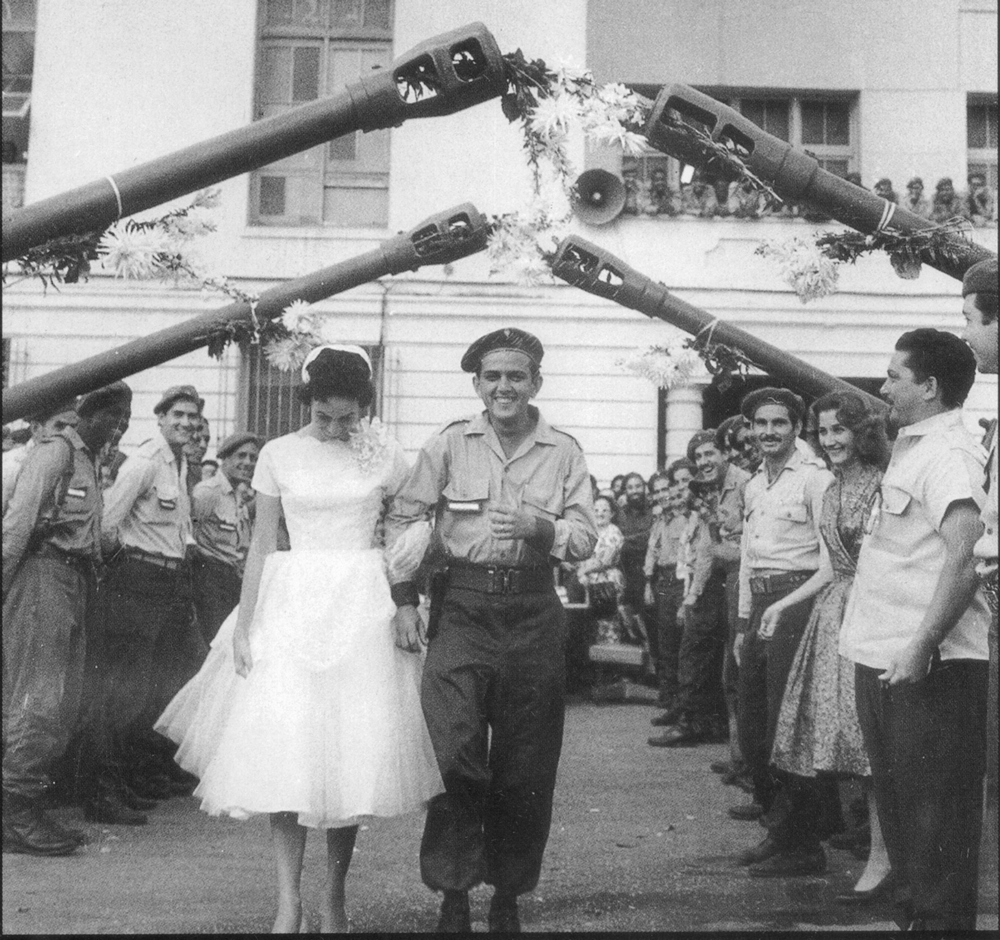 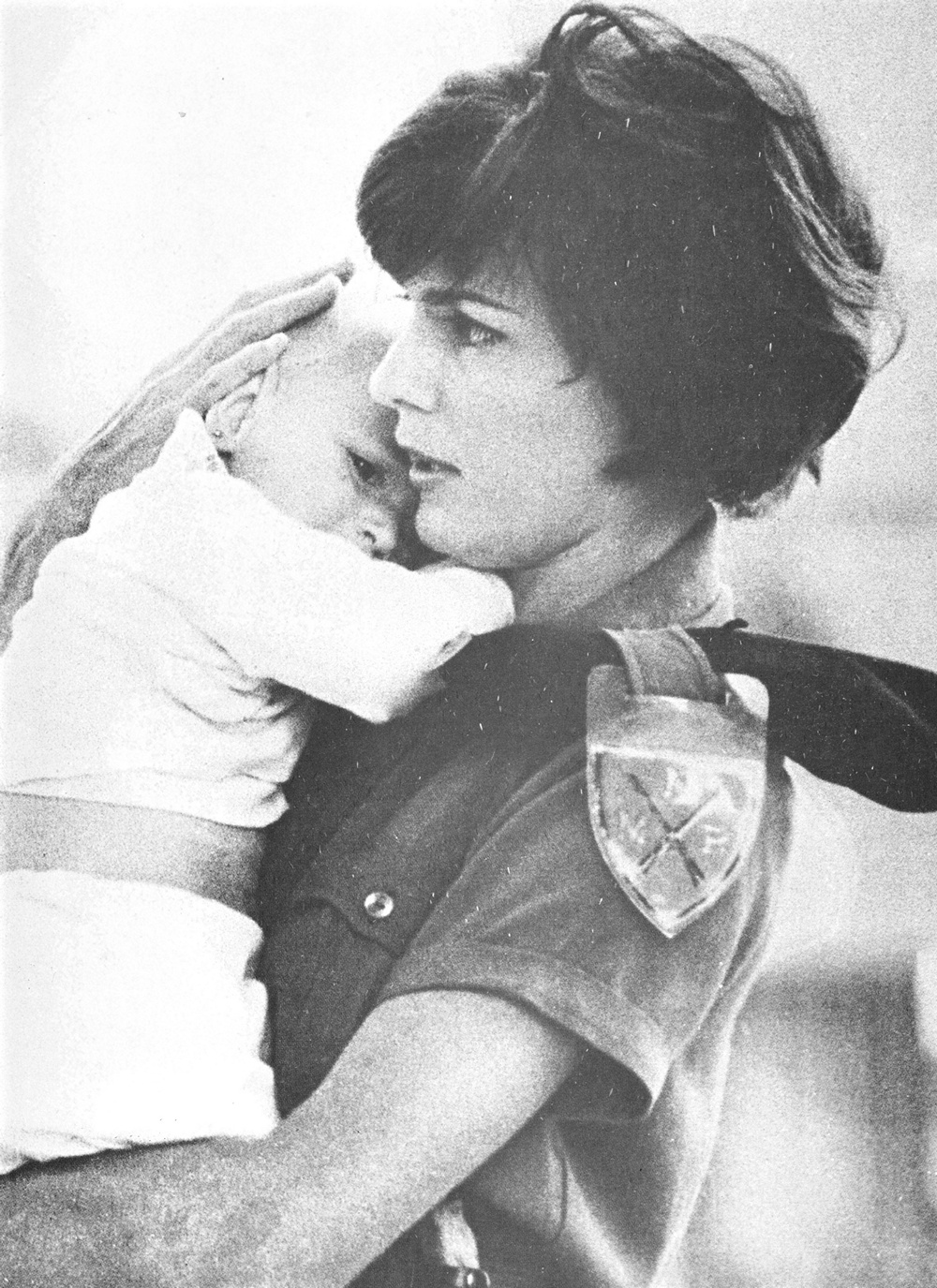
The Cuban of the '60s becomes better, more complete,
and is uplifted with happiness at his own condition. We see him grow in
these pictures, not only politically; we see him achieve a dignified
and human dimension he had not known before. We see how the sparkle in
his eye (that spark of feeling, of quick-wittedness, of insight)
becomes more transparent, sharper and dignified. We will not find
frozen, papier maché heroes in our hundred photos: at every step
we are struck by the authenticity, the strength, the vibration that
comes from within to the surface, from deep down to behaviour.
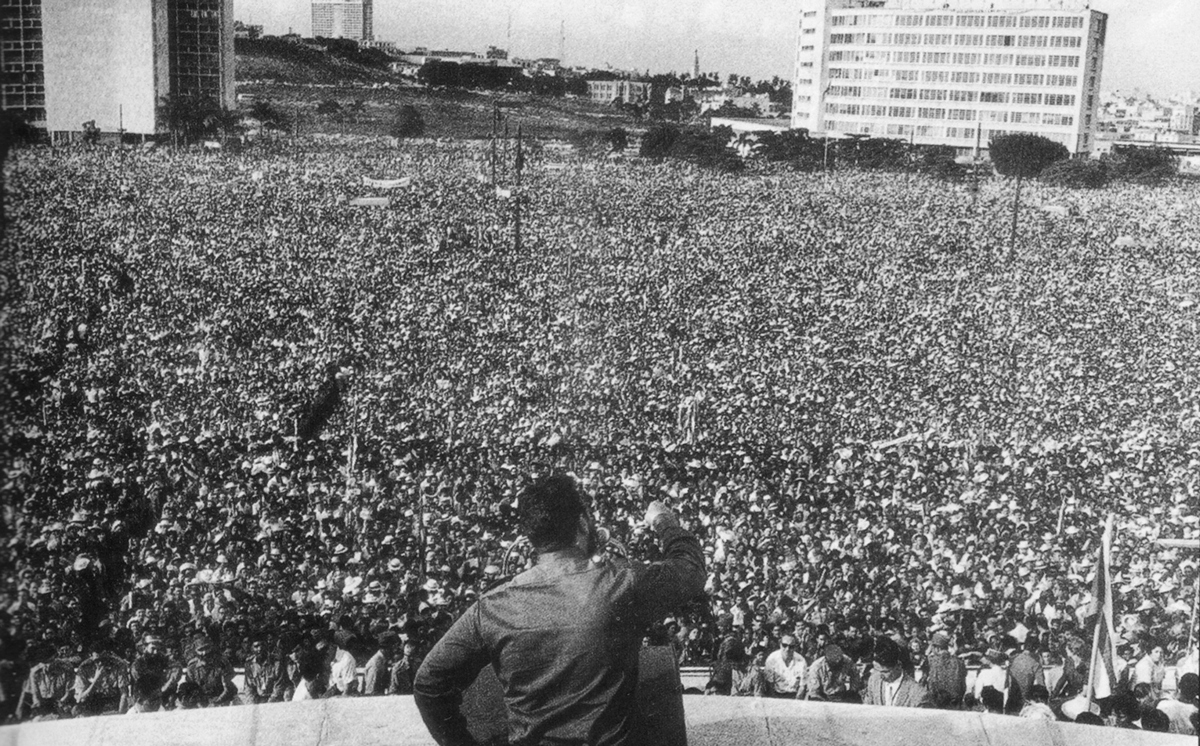
First Declaration of Havana, Speech by Fidel Castro, Revolution Square,
September 2, 1960.
In this gallery the growth of the Cuban is presented to
us in
two ways: in the expressions, the gestures, the demeanour of
anonymous characters caught by the camera, and the multitudinous
acts that lend weight and meaning to a new symbolic space born in
1959: what was Civic Square in the colonial days of farce, crime
and the negation of public spirit is re-baptized José
Martí
Revolution Square and becomes an exceptional arena of exchange
between the popular masses and their leaders. Che left us a
description of that "almost intuitive method" of
communication:
"The master of it is Fidel,
whose particular way of
integrating with the people can be appreciated only by seeing him
in action. In large public gatherings you can observe something
like the dialogue of two tuning forks whose vibrations induce
other, new ones in each other. Fidel and the mass of people begin
to vibrate in a dialogue of increasing intensity until it comes
to a climax in an abrupt ending crowned with our battle cries and
shouts of victory."[2]
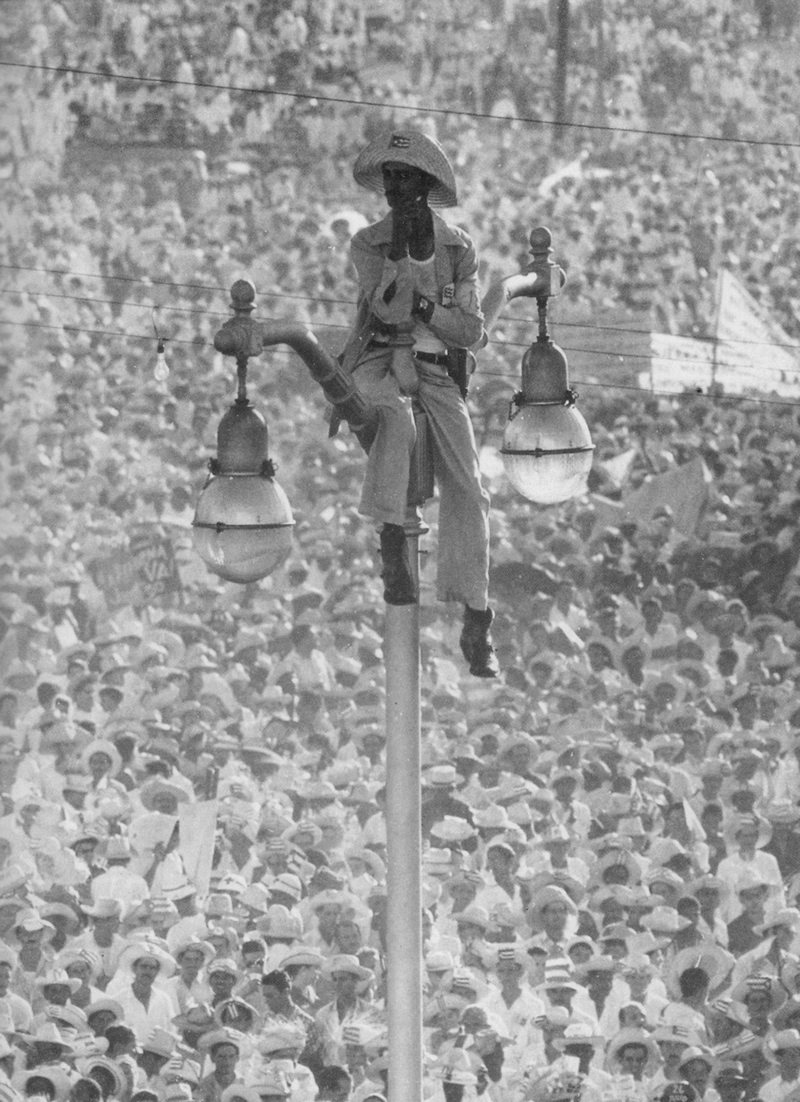 The Korda photo titled El
Quijote de la farola [Quixote of
the Street Lamp] picks up a scene from July 26, 1959, and tells us
something more. About two months earlier, in La Plata, in the
Sierra Maestra, Fidel and the Council of Ministers signed the
Agrarian Reform Law, and now the first mass rally to commemorate
the assault on the Moncada has been organized. Havana and
Revolution Square are filled with campesinos who have come from
all over the island. As in the best of our hundred images, the
Quixote in the straw hat who reigns above the crowd with his
gangly, lanky figure, half-smoked cigar and the expression of one
who lives in harmony with himself and his destiny, draws us to
the specific circumstances (the gathering of peasants, the
Agrarian Reform) and at the same time conjures up a metaphor that
goes beyond the situation and the characters photographed. The Korda photo titled El
Quijote de la farola [Quixote of
the Street Lamp] picks up a scene from July 26, 1959, and tells us
something more. About two months earlier, in La Plata, in the
Sierra Maestra, Fidel and the Council of Ministers signed the
Agrarian Reform Law, and now the first mass rally to commemorate
the assault on the Moncada has been organized. Havana and
Revolution Square are filled with campesinos who have come from
all over the island. As in the best of our hundred images, the
Quixote in the straw hat who reigns above the crowd with his
gangly, lanky figure, half-smoked cigar and the expression of one
who lives in harmony with himself and his destiny, draws us to
the specific circumstances (the gathering of peasants, the
Agrarian Reform) and at the same time conjures up a metaphor that
goes beyond the situation and the characters photographed.
With a quixotic campesino planted for eternity atop a
lamp
post, the gentleman of the utopias, the knight on an unsightly
skinny nag who attacks injustice and the impossible in an unequal
fight with the weapons of his great-grandfathers and a cardboard
trap, enters the book and must undo the schemes of so many
priests, barbers and bachelors who want to tie him (tie us) to
conformism, to the philosophy of submission, to the mediocre
wisdom of half-wits and those of mutilated spirit.
There is a lot of non-conformist, combative quixotism
in the
Cuba that defends her rights against all odds. The National
Press, founded in 1960, was inaugurated with the publication of
400,000 copies of The Ingenious Gentleman Don Quixote of
La Mancha, in four volumes, which were sold (twenty-five
cents each) in newsstands. In this way the people who were able
to overcome another impossible, illiteracy, could read the
immortal novel by Cervantes, and the last knight-errant became a
familiar presence among us. Rarely has a great literary work had
such a rich, prolific and mass reception. "Once again I feel the
ribs of Rocinante under my heels," announces Che to his parents
before leaving for the Congo: "I am returning to the road, with
my shield on my arm."[3]
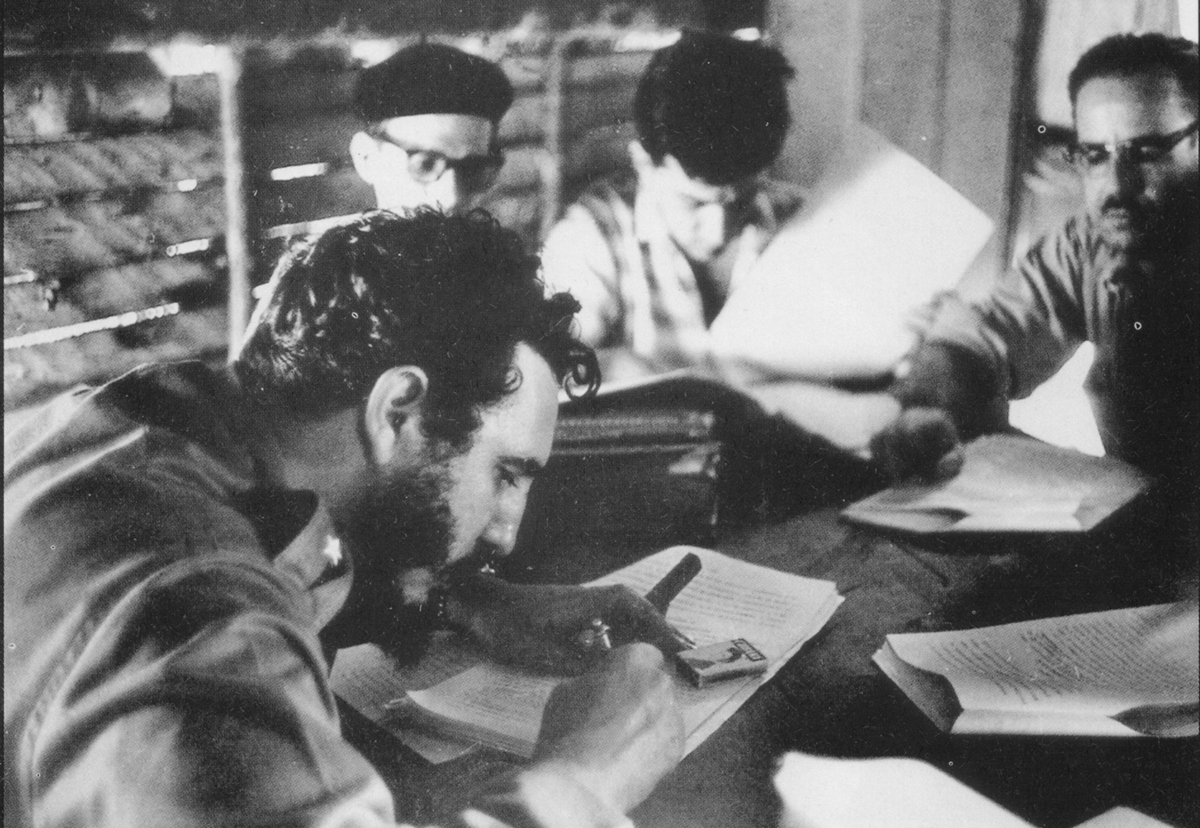 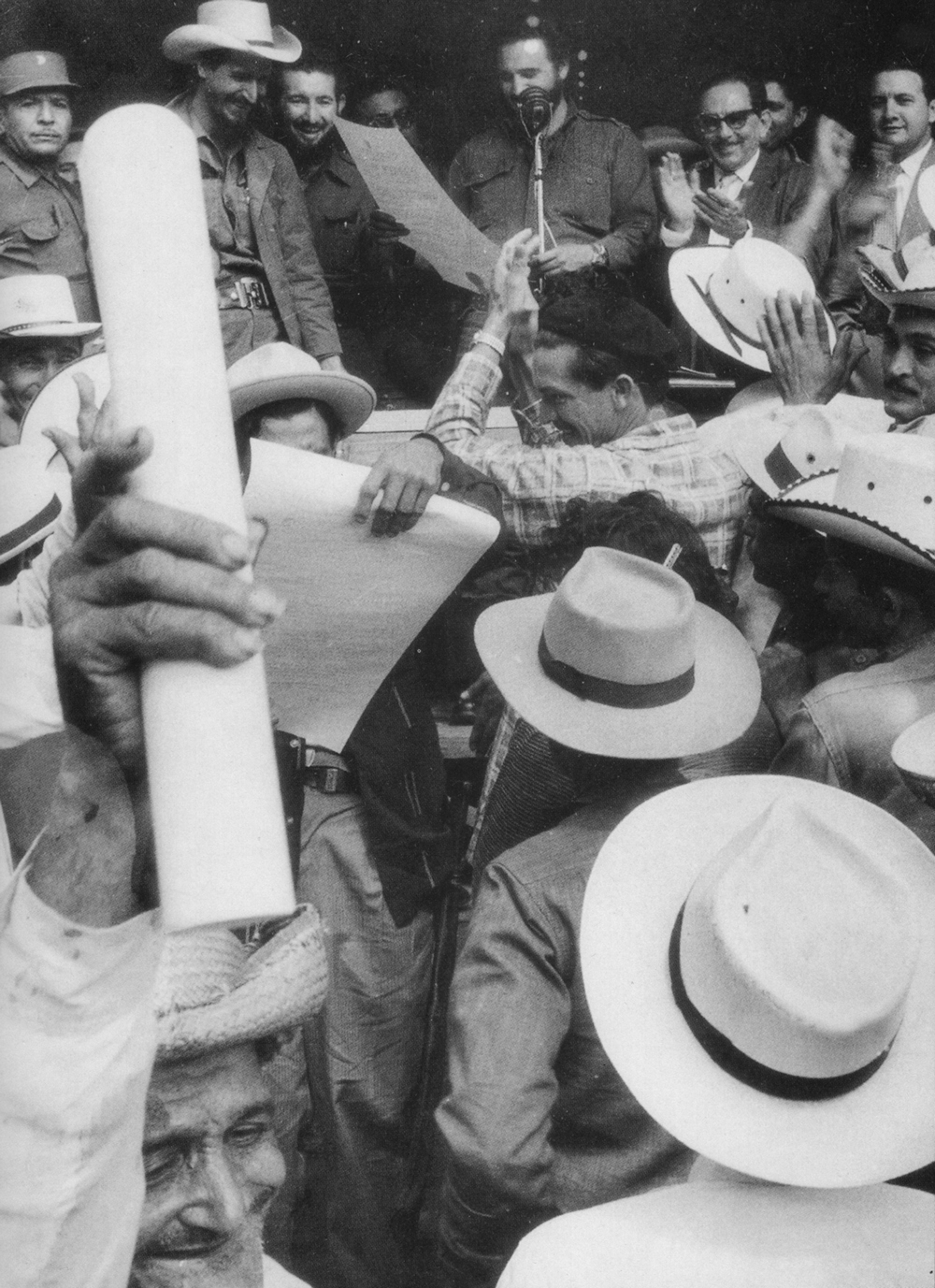
Fidel signs the Agrarian Reform Law in the Sierra Maestra in 1959.
If in the name of the meek ox who every morning chooses
without question the yoke and the delicious, bountiful oats, if
in the name of bourgeois good sense being a "Quixote" is equal to
the worst of insults, the Revolution assumes that symbol
naturally, in its noblest and most creative sense. On the
strength of the No that keeps
appearing in the Cuban ethical
tradition, in the No that
refuses to give up in the face of the
most adverse circumstances and rejects the impossible at the mere
mention of it, there is an obstinate and fertile quixotism
present. In tracing the Cuban ethical tradition Cintio Vitier
interprets the Baraguá Protest in light of that No that shines
in
the best of cubanía. When in 1878 the possibilities of
continuing the struggle for independence seemed to have been
exhausted,
"the 'impossible' rose up to
face Cuba and provoked
the more profound and creative possibility: Antonio Maceo's No,
the negation of the negation, in Mangos de Baraguá. His refusal
to accept the objective facts that seemed to definitively close
the door to the Revolution allowed him to open an airway for the
homeland. All the fabled military feats of Maceo pale before the
sheer moral majesty of the Baraguá Protest, an image cemented in
the pride and hope of the people, a new foundation for Cuba by an
act of revolutionary faith."[4]
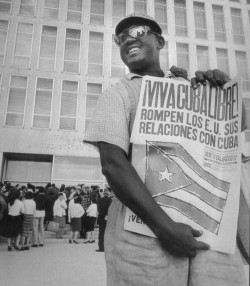 "For our people nothing is
impossible anymore," said Fidel,
in front of the Presidential Palace, January 20, 1961, in
greeting the militias on their return to civilian life after a
massive mobilization. In a similar event, the same day, in
Santiago de Cuba, Raúl declared: "We destroyed the myth that
without the Americans we would die of hunger."[5]
While these events are
being
celebrated in Havana and Santiago, the last U.S. diplomats are
leaving for home, after the break in relations, their withdrawal
reaffirming that indeed nothing is impossible anymore; the evil
myths have been smashed: geographic fatalism, the laws of
annexationist gravitation, the "infernal spells." "For our people nothing is
impossible anymore," said Fidel,
in front of the Presidential Palace, January 20, 1961, in
greeting the militias on their return to civilian life after a
massive mobilization. In a similar event, the same day, in
Santiago de Cuba, Raúl declared: "We destroyed the myth that
without the Americans we would die of hunger."[5]
While these events are
being
celebrated in Havana and Santiago, the last U.S. diplomats are
leaving for home, after the break in relations, their withdrawal
reaffirming that indeed nothing is impossible anymore; the evil
myths have been smashed: geographic fatalism, the laws of
annexationist gravitation, the "infernal spells."
With Moncada, according to José Lezama Lima,
those
"spells"
that immobilized the Cuban begin to dissipate. The Revolution
bestowed the potens ("that
which is infinitely possible") which
boiled down to the unlimited potentialities of man, his capacity
for a poetic and historical creation of an unexplored
magnitude:
"Now that possibility, that potens has been acquired by
the
Cuban [...]. The Cuban Revolution signifies that all the negative
spells have been decapitated. The ring that fell into the pond,
like in the ancient mythologies, has been found again."[6]
One of the spells that needed to be decapitated, the
most
diabolical and paralyzing spell of the impossible, was summed up
in a phrase often repeated during the neo-colonial republic: "The
Americans are not going to permit this." It was the syndrome of
the Platt Amendment, the Damocles sword of the intervention,
which survived the ominous constitutional appendix and became a
substantive part of an imbecilic, dependent culture. The Plattist
philosophy of the they-are-not-going-to-permit-this..., had
suffered serious blows with the Agrarian Reform, the
nationalization of the Yankee corporations and other
revolutionary measures, but it was definitively defeated in the
days of Girón, that appear here with the power and quick
chronology of a series of prints: April 15, the bombardments and
the copious blood of the militia fighter Eduardo García
Delgado[7]; the
16th, the
event at the corner of 23rd and 12th, at the burial of those fallen a
few hours before, and machine guns and rifles taken up now for
socialism; April 17, Fidel on the battlefield, at Playa
Girón.
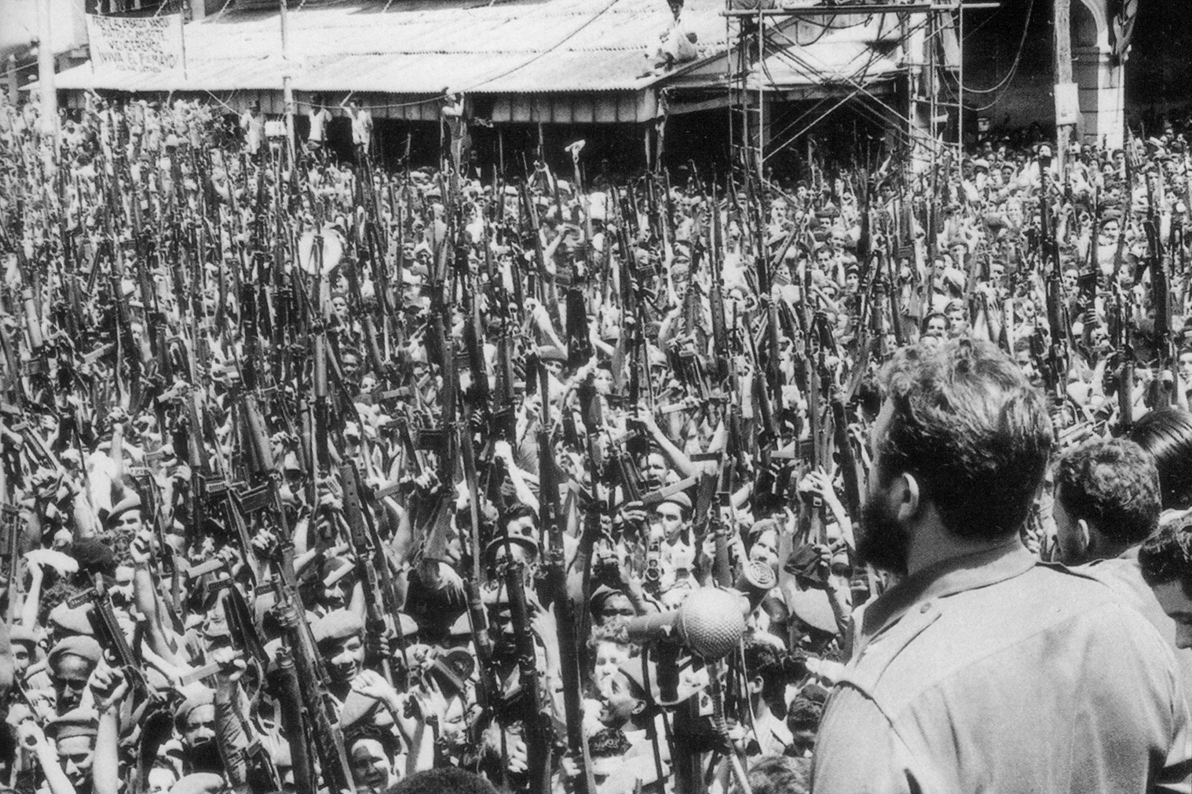
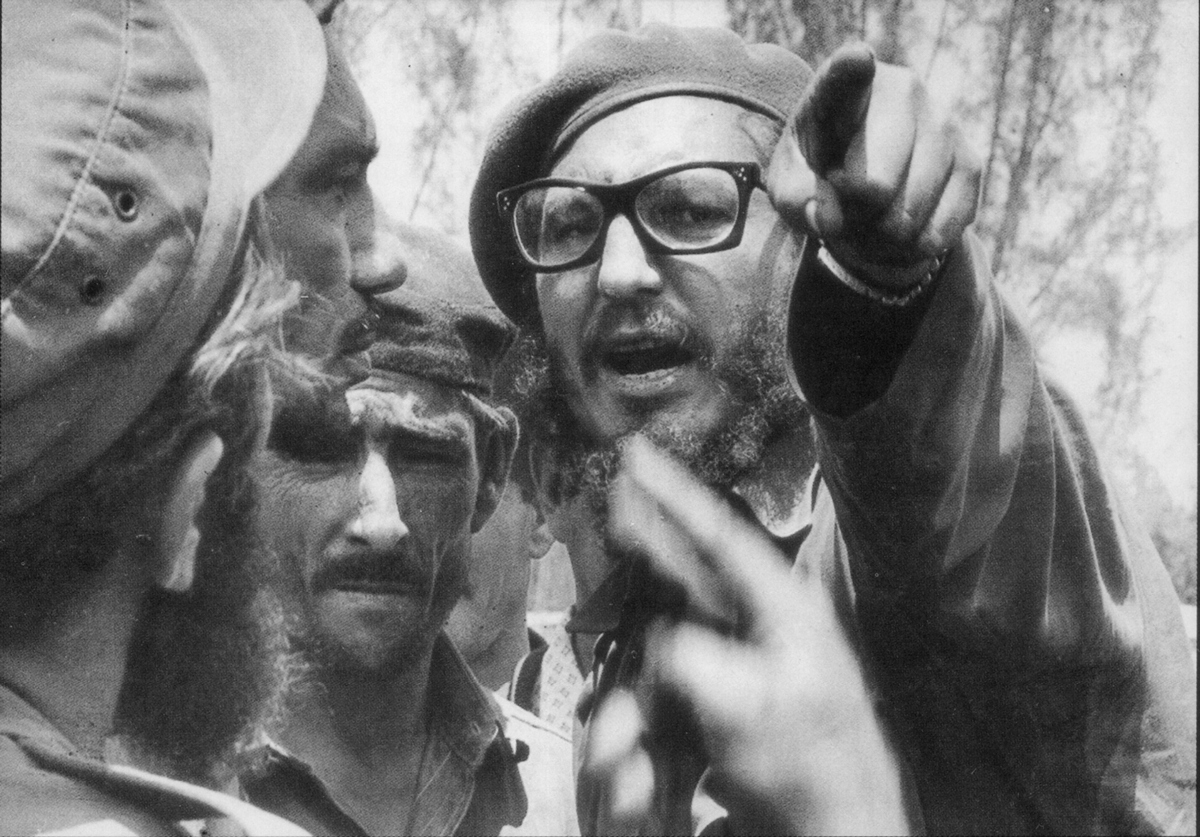
This is how the Empire tasted defeat in its back yard,
Latin
America became a little freer, and an accursed word like
socialism (something that never, ever, under any circumstance, would
the "Americans" have permitted) was implanted in the
consciousness of the people, organically, together with the
notion of independence ("permissible" only, of course, in its
outward manifestations), and nobody on the island looked north
any more to wonder how far we could go, or what the "Americans"
would think of us.
Of course, the philosophy of
they-are-not-going-to-permit-this... originates and is maintained
in the imperial appetite for the island, born in the days of
Thomas Jefferson, and has remained unchanged through to
Torricelli and Helms. The geopolitical scheme that imagines Cuba
as a kind of "island-fruit" determined by Fate, or Destiny, or
some such, to serve as food for the "giant with the seven-league boots"
has been one of the pillars of the impossible, and Cubans could
see the shadow of such a dangerous neighbourhood from the time of
their earliest yearnings for independence. On January 1, 1959,
the "island-fruit" radically renounced its condition; it became
"forbidden fruit," poison, and that very day, with the Eisenhower
government’s welcoming of murderers and torturers fleeing popular
justice, a policy of hostility was initiated that has been going
through the most diverse repertoire of attacks: Girón, La
Coubre, assassination plots against Fidel and other leaders,
infiltrations, support for armed gangs, germ warfare, radio and
television stations with subversive missions, slander, diplomatic
pressure, the blockade, unspeakable laws such as the
Helms-Burton. That is, the "Americans" took seriously that there
were things they "could not permit" and have used all their power
not to permit, and they have failed.
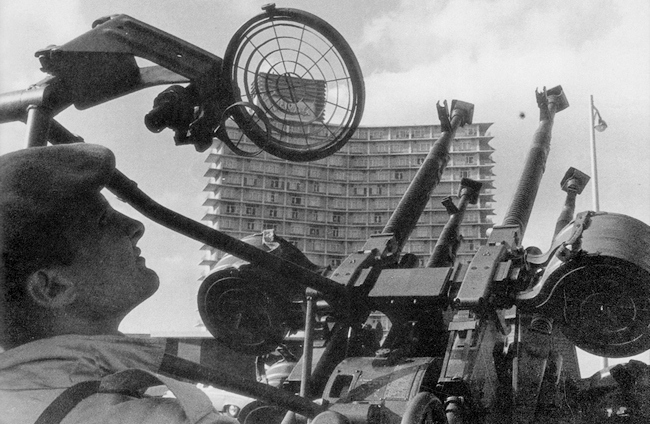
On October 23, 1962 headlines in the press announced
that
"the nation has risen up in arms, ready to repel any attack." The
collective memory of Cubans remained marked by those hours when
this people, according to the testimony of Roberto Fernández
Retamar, between bombs that were
almost certain to come / and the
missiles that finally left / [...] he put on his militia uniform,
/ to see what had to be done.[8]
Some 300,000 reservists and soldiers were
mobilized: men and women of all ages enlisted in the militia,
they joined the health brigades, donated blood in hospitals,
filled in for those who had been mobilized in industries and
other workplaces, and went about becoming a collective example of
courage and moral fortitude, that stood tall in the midst of the cold
chess game played by the great powers that was the "cold war." In
his farewell to Fidel, Che devotes a special memory to that
moment of "perils and principles":
"I felt at your side the
pride of belonging to our people in
the bright and sad days of the Caribbean Crisis. Rarely has a
statesman shone more brightly than in those days; I am also proud
of having followed you without vacillation, identified with your
way of thinking, and of seeing and appreciating the perils and
the principles."[9]

A militia battalion marches along the
Havana Malecón.
There is an emblematic photo by Corrales that evokes the
day-to-day atmosphere of the October Crisis: what we might call
"the everydayness of danger" that is accompanied by an
"everydayness of principles." A militia battalion lines the
Havana Malecón, with their old rifles and more or less
threadbare
jackets as the "North" punishes them and bursts of rain and the
waves of a stormy sea hit them. Looking at the image you can
almost touch the cold, cutting wind that causes the flag to
vibrate and stabs their wet bodies like a knife. Over the island,
over these men and their families, hang the most terrible
imperial threats: of a naval blockade, massive aerial attacks,
and even the use of nuclear weapons. Those rifles and the grim
march of the battalion to who knows what point on the coast may
seem "quixotic" and even useless faced with the enormity of the
enemy. From the photo itself, if examined carefully, there
emerges slowly, against all odds, the No
of Baraguá. It starts
taking on the impact of Quixote when he knocked down the bachelor
Samson Carrasco, and we find ourselves at another "founding of
Cuba by an act of revolutionary faith" and understand that a
battalion like that, even if it were struck down and wiped off
the map, would open "an airway for the fatherland."
It would be easy to describe as "quixotic"
Martí's goals when
he tirelessly prepared the uprising of 1895. Not only does he
propose to wrest Cuba from colonial Spain, willing to go through
"right up to the last man and the last peseta" on the Island, and
build an independent Republic "with all and for the good of all":
he wants to stop the spread of the northern Empire; lay the
foundations of a free and united Latin America; and contribute to
the "still faltering" equilibrium of the world. Martí's
"quixotism" is taken up by the Revolution of '59, and many of its
aims find fulfillment and expression in the imprint left on the
island, in the world and its equilibrium, by the Cubans who
populate our hundred images.
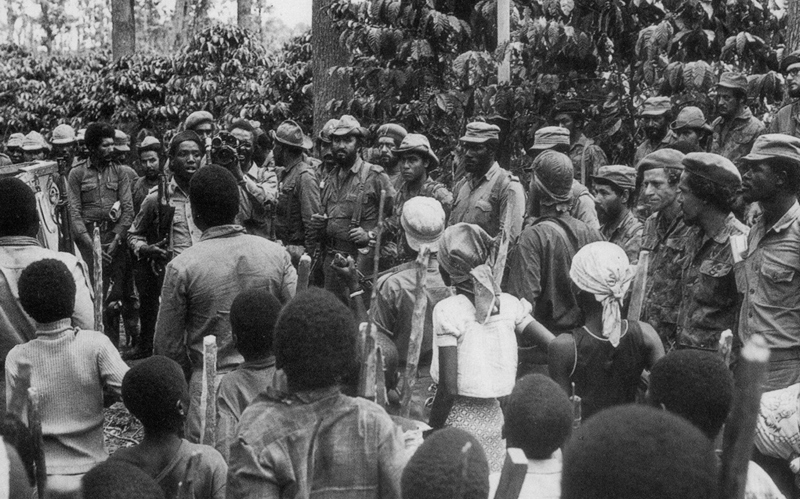
Cuban volunteers fight alongside Angolans in their war for liberation
in Southern Africa.
|
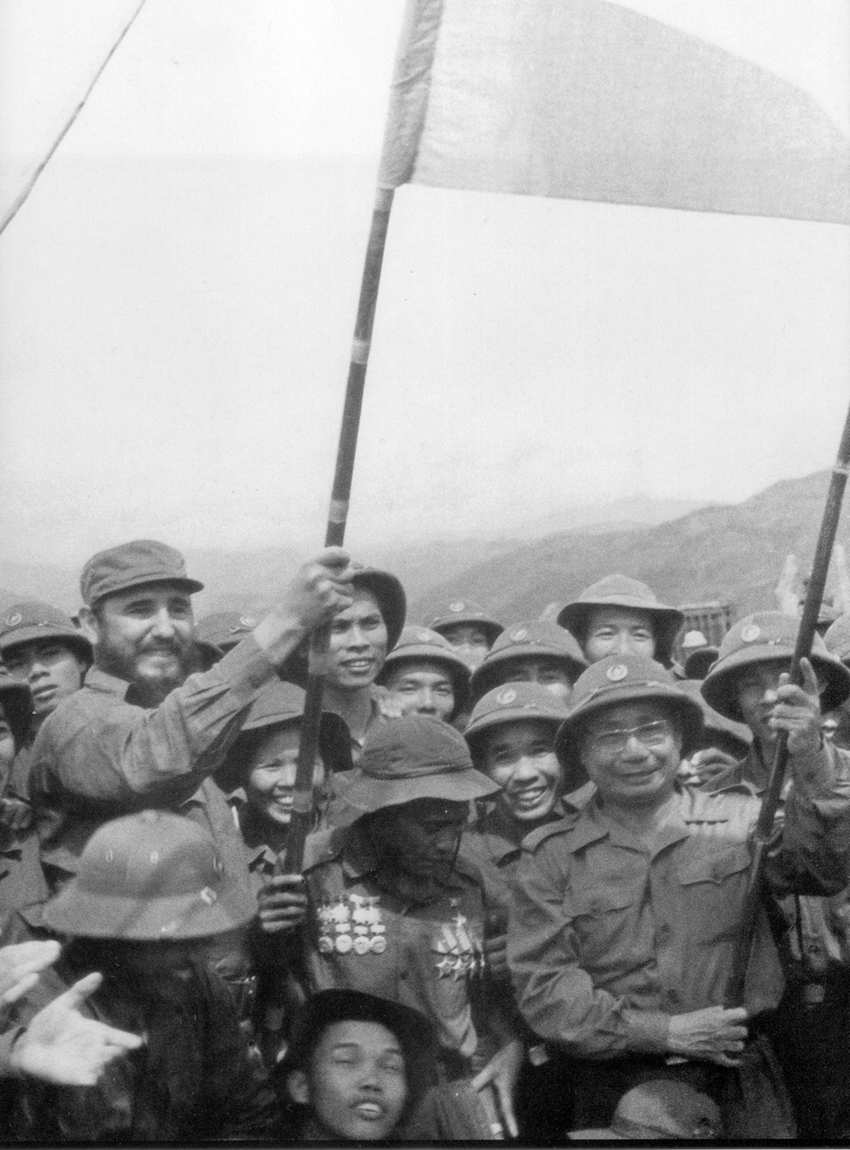
Fidel in liberated territory in Vietnam, 1973.
|
The internationalist character and vocation of the
"necessary war," and of the Republic it foreshadowed still come today
through secret channels, to form the blood and substance of the "new
sensibility" that Nicolás discovered for us in 1960. When
patriotic feelings and the defence of national values are
reinforced, there is never space for chauvinism or for a
parochial vision of our efforts in "that uncommon conception of
civic duty:" On the contrary, the identification with "the poor
of the earth" increases day by day, and not only among the
vanguard, but on the level of the masses. This people recognizes
its cause in the cause of many other peoples, and solidarity is
cultivated in its new way of "practicing cubanía."
Several pictures speak to us of the internationalism of
revolutionary Cuba: Che; our fighters in Angola; our doctors and
teachers; the children of Chernobyl; Fidel in the liberated
territory of South Vietnam, or with Salvador Allende, or Mandela.
More recent photos (Fidel in Cartagena de Indias, La Paz,
Montevideo, received by thousands of men and women who salute in
him the highest expression of Latin American dignity) show us the
other side of the internationalism engaged in by Cubans: the
solidarity the Revolution has received through all its existence,
and that has become much broader and more effective since the
collapse of European "real socialism." The popular demonstration
in Montevideo in 1995 responds symbolically, over thirty years
later, to the foreign ministers' meeting in Punta del Este,
Uruguay that expelled Cuba from the OAS in January 1962.
There are photos that touch on different aspects of the
work
of the Revolution: health, education, culture, sport. Others
remind us of moments of particular significance: on May 1, 1980,
for example, with the march along the Malecón of more than a
million Cubans to the former U.S. embassy, known as the second
March of the Fighting People.
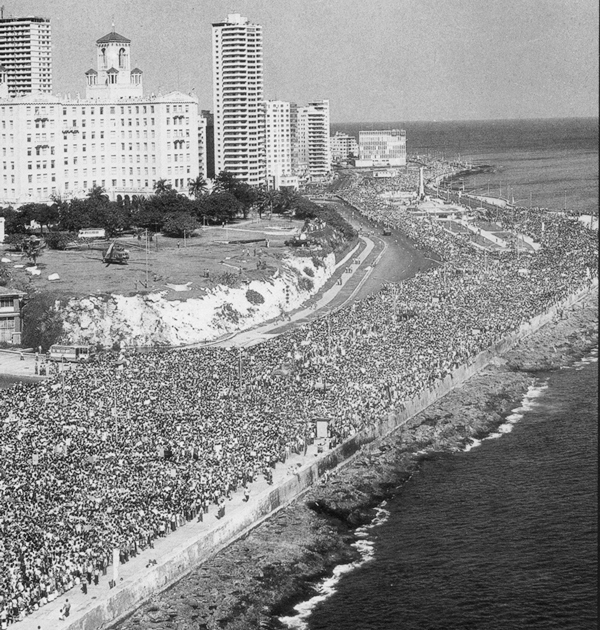
Second March of the Fighting People, May 1, 1980.
Two photos (the opening of a day care centre and the
revival
of the micro-brigades) evoke the process of rectification that
was initiated in 1986. The country was stepping up preparations
to defend itself, alone, faced with the threats from Reagan who
three years earlier had invaded Grenada and declared his
determination to contain "communist expansion in Central America"
with fire and sword as he sharpened his warmongering rhetoric
against Cuba and Nicaragua. At this juncture, Fidel denounces an
internal enemy that is ultimately as dangerous as the external
one. Cuban society notices in itself, in its official structure
and its social fabric "diabolical mechanisms," "errors and
negative tendencies" that, in fact, can irreversibly damage the
very foundations of the Revolution: "it is not a question of a
campaign; this is a great battle, a great process, a great
continuous struggle," "a strategic counter-offensive" which
appeals to the "moral richness" and "critical spirit" of the
people to confront the distortions, corruption, irrationality
that exists in the "logic" of the technocrats, the "Creole
tendency towards chaos, anarchy and lack of respect for the law,"
the demoralization, "copismo" [copying from the models of
others -- TML Ed. note], the don't-get-into-a fight attitude
and that "type of mysticism, the dream [...] that the mechanisms
were going to solve everything."
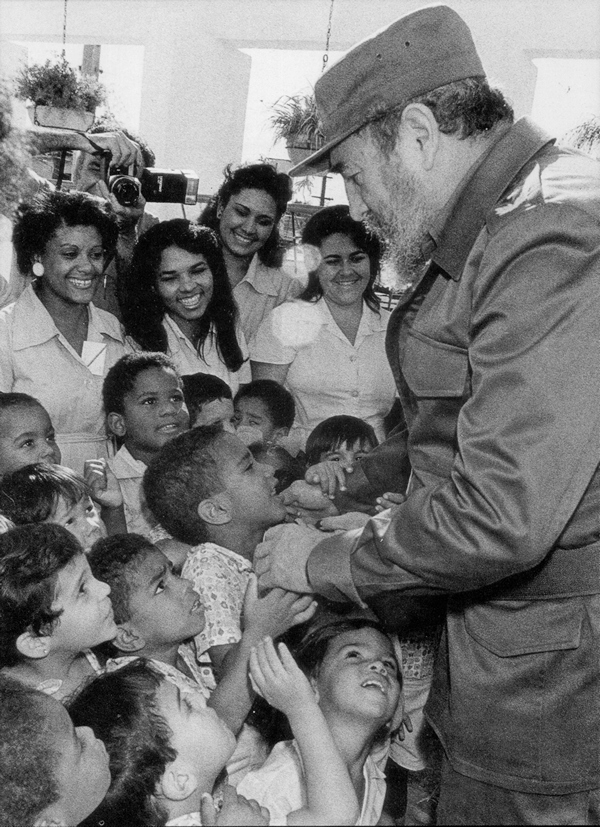 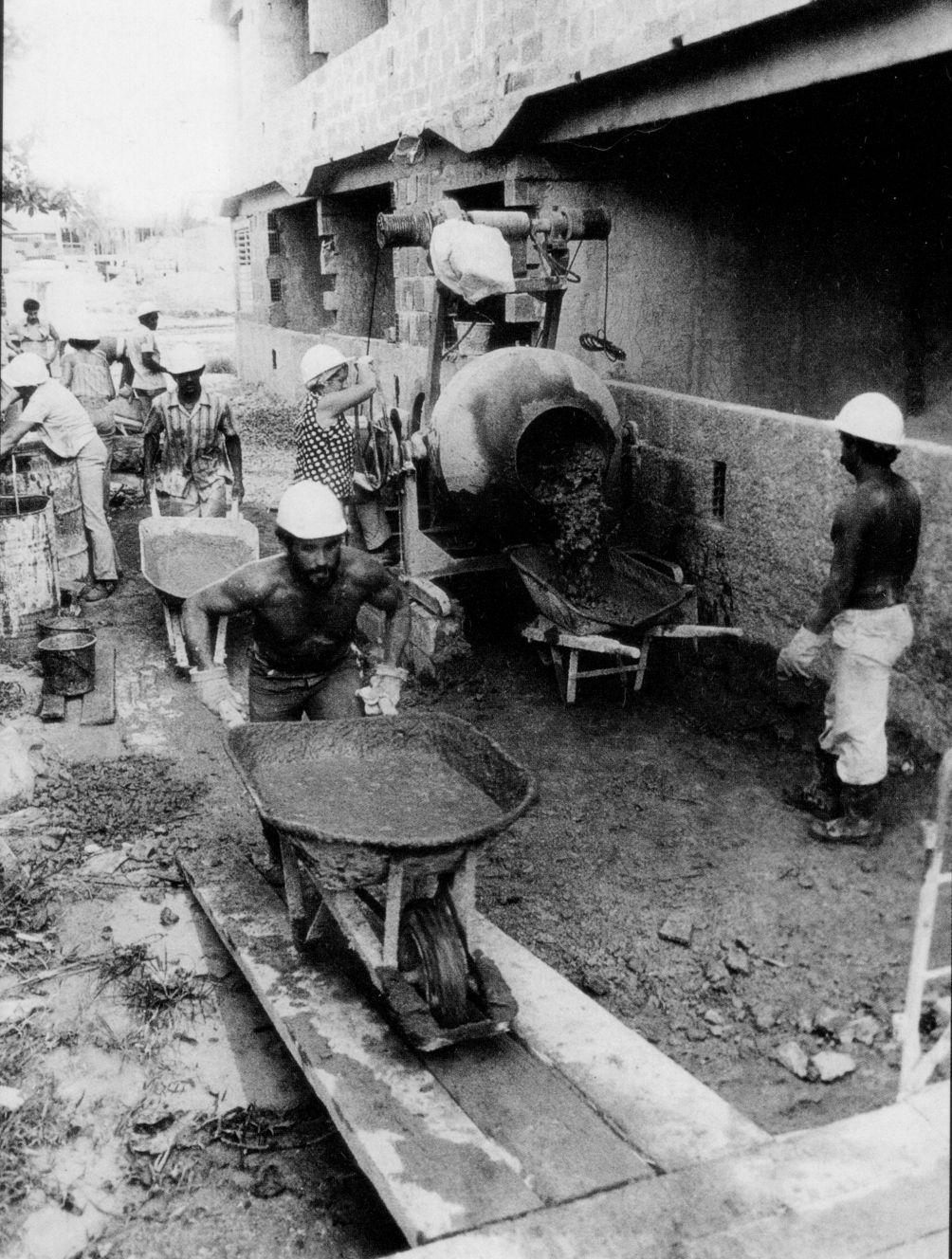
Left: Fidel opens day care centre; right: photo of revived
microbrigades.
With this process, with the will to rectify and the raw
and
courageous self-criticism that accompany it, the Cuban Revolution
once again demonstrates its moral reserves, its anti-bureaucratic
spirit, its capacity for intelligent self-renewal and to combat
and overcome the forms of the impossible that might spring (are
springing) from its own bosom. In fact, when we exorcise the
"creole" demons and those that have been developing in other
socialist experiences from revolutionary positions we are not
only working for Cuba, "but for the cause of socialism in
general":
"This is a long fight that I
believe has to do not only
with
our Revolution. It has been proven that this problem has shown up
in other places. It is proven. Privileges here, something else
there, demoralization here and there, and it gets to a point where
the masses, confused, demoralized, are the victims of anyone who
tells them some fairy tales, of any demagogue, any
pseudo-revolutionary, any pseudo-democrat."[10]
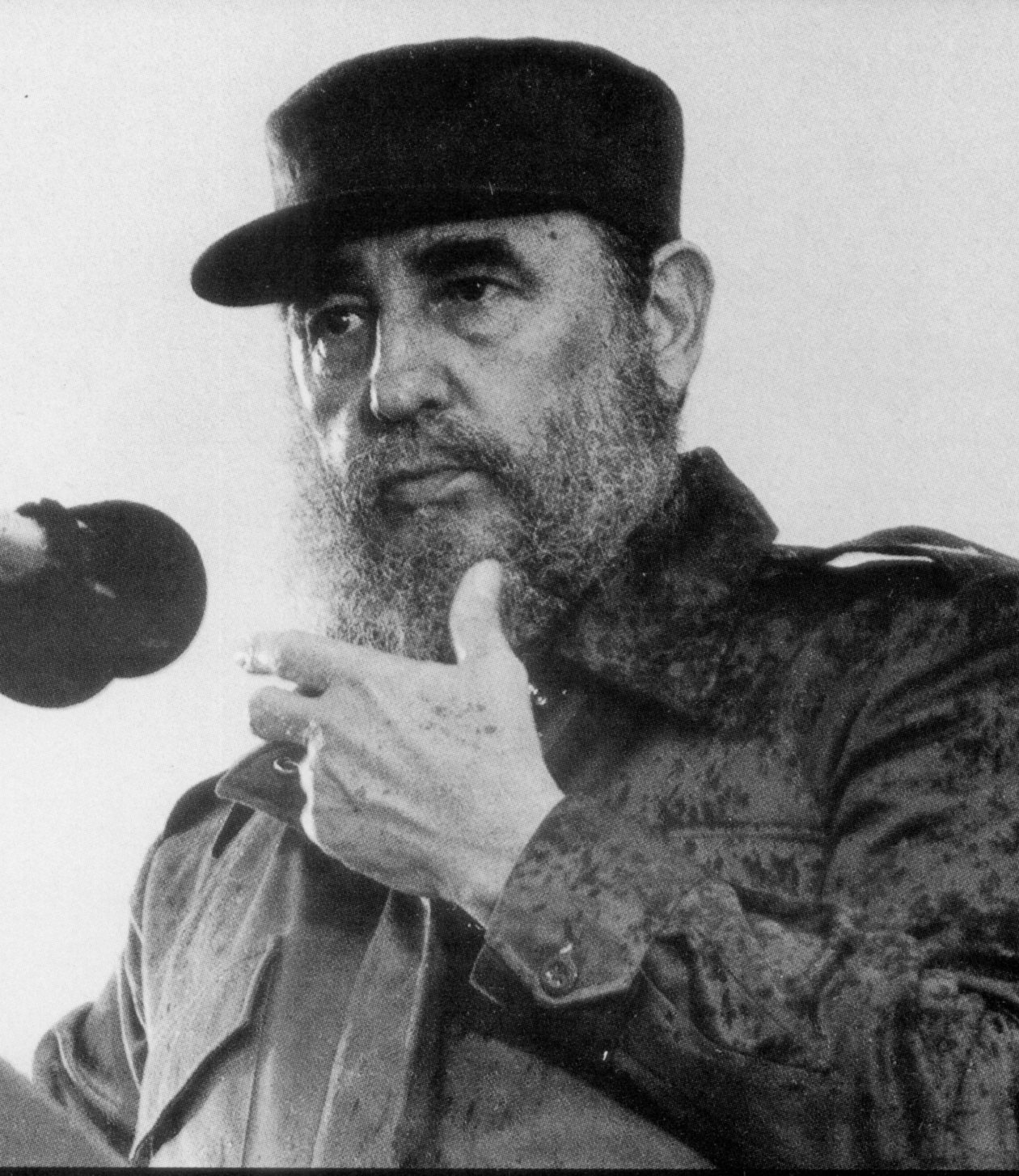 Two of these hundred images
were taken during a ceremony in
Camagüey: the celebration of July 26th in 1989. It had been
drizzling the whole time (dark drops are seen on Fidel's uniform
and some umbrellas protrude from the hushed crowd standing in
rows, listening attentively to the speech), and in the
background, once again, the statue of Martí, on a billboard,
speaking about "our morality and our honour." It was not just
another ceremony: it came at a decisive moment in the history of
the century. Bush had just held a triumphal tour with a visit to
Poland and Hungary where the forces of capitalist restoration
already had decisive weight; in the USSR the so-called reformers
were consolidating their positions, while the national and
inter-ethnic contradictions along with other internal tensions
were sharpening; the Empire and reaction were organizing the
funeral of socialism, in the midst of an overpowering chorus that was
joined by opportunists and repenters. Two of these hundred images
were taken during a ceremony in
Camagüey: the celebration of July 26th in 1989. It had been
drizzling the whole time (dark drops are seen on Fidel's uniform
and some umbrellas protrude from the hushed crowd standing in
rows, listening attentively to the speech), and in the
background, once again, the statue of Martí, on a billboard,
speaking about "our morality and our honour." It was not just
another ceremony: it came at a decisive moment in the history of
the century. Bush had just held a triumphal tour with a visit to
Poland and Hungary where the forces of capitalist restoration
already had decisive weight; in the USSR the so-called reformers
were consolidating their positions, while the national and
inter-ethnic contradictions along with other internal tensions
were sharpening; the Empire and reaction were organizing the
funeral of socialism, in the midst of an overpowering chorus that was
joined by opportunists and repenters.
On that rainy day, before a silent crowd who were
becoming
increasingly aware of the unprecedented challenges that awaited
Cuba, Fidel referred to the "moral rockets" that were erected
among us during the October Crisis and that had not left the
Island:
"We must warn imperialism
not
to have so many illusions
about
our Revolution and the notion that our Revolution would not be
able to resist if a debacle occurs in the socialist community
..."
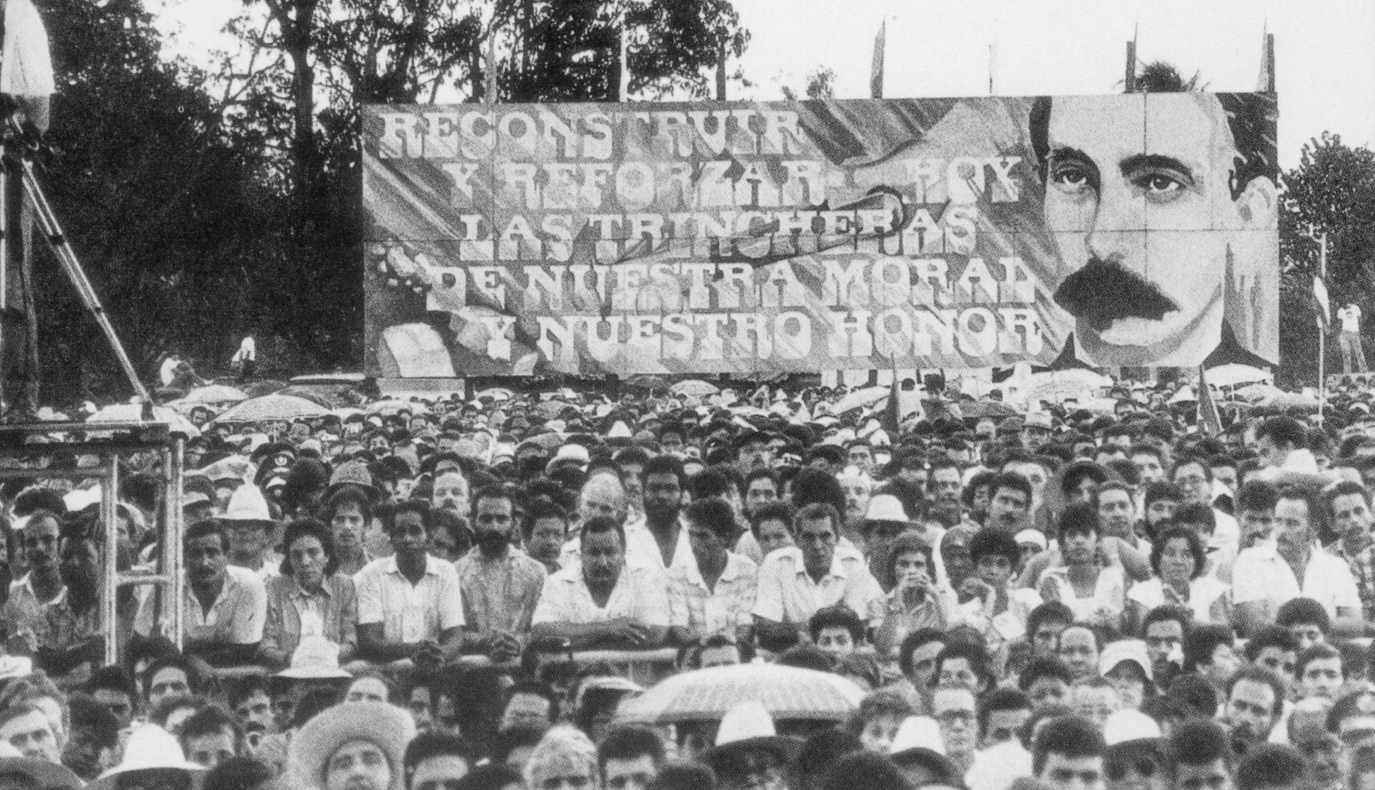
Celebration of July 26, 1989, Rebellion Day, in Camagüey.
Even if it should happen that the USSR disintegrates,
"if
tomorrow or any day we wake up [...] with the news that the USSR
has disintegrated [...], even in those circumstances Cuba and the
Cuban Revolution would continue fighting and continue resisting!"
What's more, "when it comes to defence we learned some time ago
to rely only on our own forces [...] Not even the worst scares
us, neither the worst premise nor the worst
hypothesis!"[11]
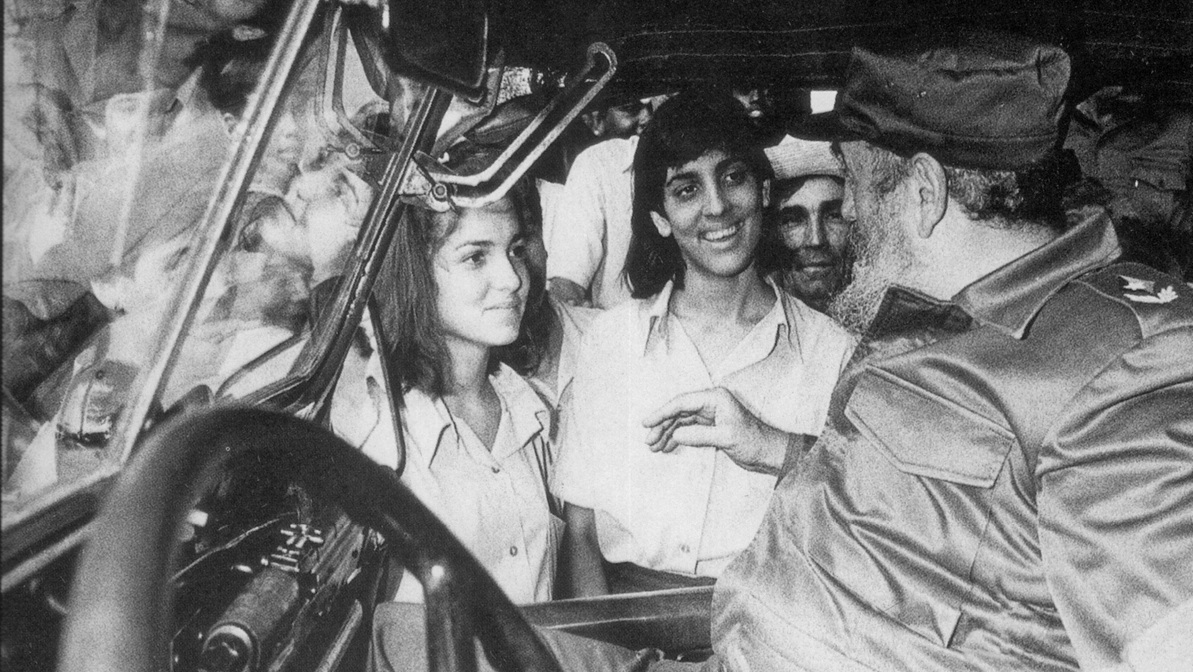
Fidel speaks to young students studying Lenin, 1990.
Starting in 1989 the impossible once again came to face
the
Cuban Revolution. Three or four months after the ceremony
captured in the photo, the collapse of the Berlin Wall is
celebrated; there are those who theorize about the "domino
effect" that would lead to all the socialist countries falling
one by one. The events in Eastern Europe seem to confirm such
prophecies; the advent of the unipolar world and a much stronger
and more totalitarian Fourth Reich than the one Hitler dreamed of is
announced with gold trumpets; capitalism and the market are
exalted from one end of the planet to the other as a system
conceived by Providence for the salvation of humanity, and every
anti-capitalist objection, however timid, is immediately
disqualified as a deplorable lapse, or as absurd, insane,
unnatural speculation, like the most feverish of quixotic
delusions. In some places statues of Marx and Lenin are replaced
by those of Scrooge McDuck, the millionaire uncle of Donald Duck,
and there are communist parties that change their name, that
dissolve or split, and many on the left do not know where to
turn, showing their confusion through their babbling, while
others crumble, like the wall, and try to bury their "red" past
with self-flagellation and self-criticism as they rush to praise
the victors and the Golden Calf.
In December 1989 the Yankees invade Panama, and bomb,
kill
and bury the dead with efficient bulldozers; in February 1990,
the Sandinista Front loses an election held under pressure from
the United States and well-armed "contras" as an instrument of
imperial blackmail; in 1991, in January, there is the world
premiere on television (more widely televised than the Oscars) of
a war-show, the Gulf War, where the American Rome flaunts its
impunity and the sophisticated technologies of its destructive
power; in February, in the discussion of an export law the U.S.
Senate approves the Mack Amendment, seed of the "Torricelli Law;"
in September of the same year, the official demise of the Soviet
Union is announced. From Cuba, Maceo's No is repeated and this
people, with their leaders, together with a party that maintains
its name and its ideals intact, begins to wage its day by day
feat of endurance.
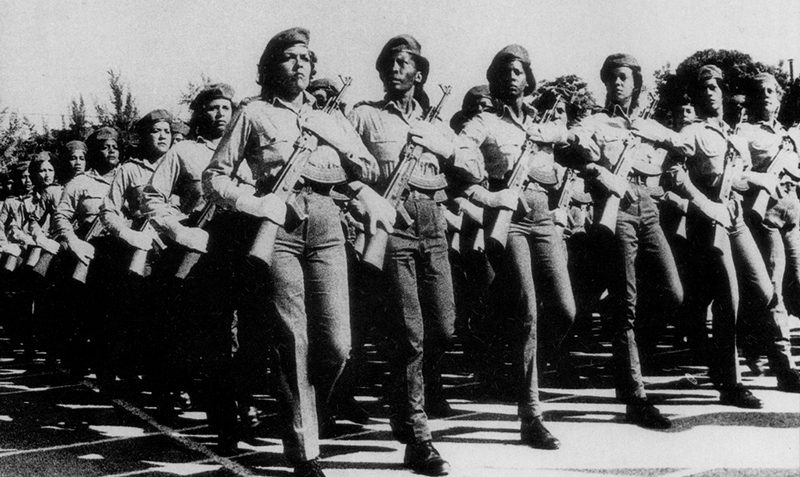
Defending revolutionary Cuba, 1990.
There are photos here that touch on the quiet exploits
that
Cubans have been displaying in the extremely harsh daily life of
the Special Period: There are (obviously) not enough. One day
there will have to be a gallery exclusively for those years in
which this people strained with all of its energy, imagination,
strength and creativity, and gave the No
that was required by
such a colossal impossible. Of course in that gallery, just like
it cannot be overlooked in this book, there will appear the image
of Fidel with his people on August 5, 1994, on the front line,
when lumpen elements (unpatriotic by definition) tried to give
the Empire a gift in the form of a parody of its much hoped-for
"internal strife;" and it will have to include a view of the
crowd gathered a year later, in 1995, outside the Castillo de La
Punta: hundreds of thousands of Habaneros fill the esplanade, the
Malecón, Prado, San Lázaro, to confirm that August 5 is
and will
be a day of the Revolution, one of those empty days waiting to be
filled and to burn.[12]
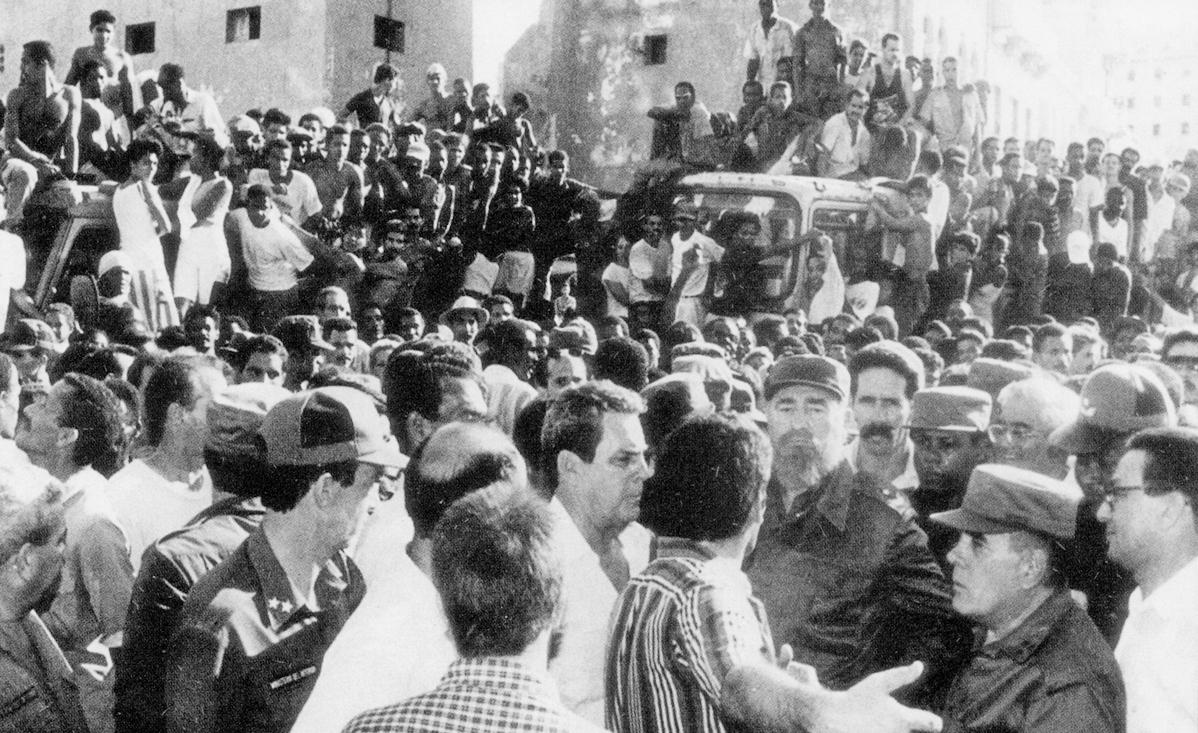
Fidel, on the front lines with the Cuban people, August 5, 1994.
One day that poster, as flat and empty as the ceremonies
organized by Batista for Martí's Centennial, also became filled
with meaning and shone. A simple framed poster hung in the office of
the head of a prison in a sterile, formal and offensive gesture,
changed symbolically to take on an unexpected relevance in the first
photo of the book. Another photo, taken on
April 11, 1995, a hundred years after Martí's landing, brings us
Fidel's personal tribute in the steep, rocky surroundings of La
Playita de Cajobabo. Martí's thought, his presence, is in the
First Declaration of Havana, in September 1960, and the Second,
in February 1962, and there at Moncada, and in the "History
Will Absolve Me," and with all dignified Cubans, on July 26,
1989, and together with the "mestizo, capable, inspiring masses
of the country," with "that intelligent and creative mass of
blacks and whites"[13]
that keeps overcoming the hardships and obstacles of the past
years.
Fidel's relationship with history (noted in the photo of
Playitas and others included here) is not the cold and cerebral
one of scholars, although it is based on a wealth of information
that often extends to the minutest detail. It is not that of the
traditional politician who refers to the past to support his
program with illustrious antecedents, or as a pure rhetorical
device: Fidel approaches history to understand it intellectually,
analyze its twists and turns, its events and personalities and
extract its essential lessons; but he lives it with the "soul of
a guerrilla" and looks in it for material to plan the Cuba that
is "possible," the Cuba that will receive its unanimous
recognition only from "posterity." From the Isla de Pinos prison,
in a letter dated March 3, 1954, he refers to the role that the
book, Chronicles of the War
by Miró Argenter played for those
who
carried out the assault on Moncada. "It was a real Bible for us,"
he says. "Many times," he adds,
"he reviewed our thinking
[on]
the immortal march of the Invading Army with it, living through every
battle with emotion and trying to pick up as many useful tactical or
strategic details as he could. And even when times have changed, along
with the art of doing battle, all those acts flow from an immutable
sentiment, the only one that makes the impossible possible and obliges
posterity to unanimously believe what to many contemporaries seemed
beyond belief. The pages of Chronicles
of
the
War are filled with that sentiment, and whoever upon
reading them does not feel his blood boil, full of faith in our kind,
his soul seized by a desire for emulation, and his face go red at the
affront, it is because he was not born with the soul of a guerrilla."[14]
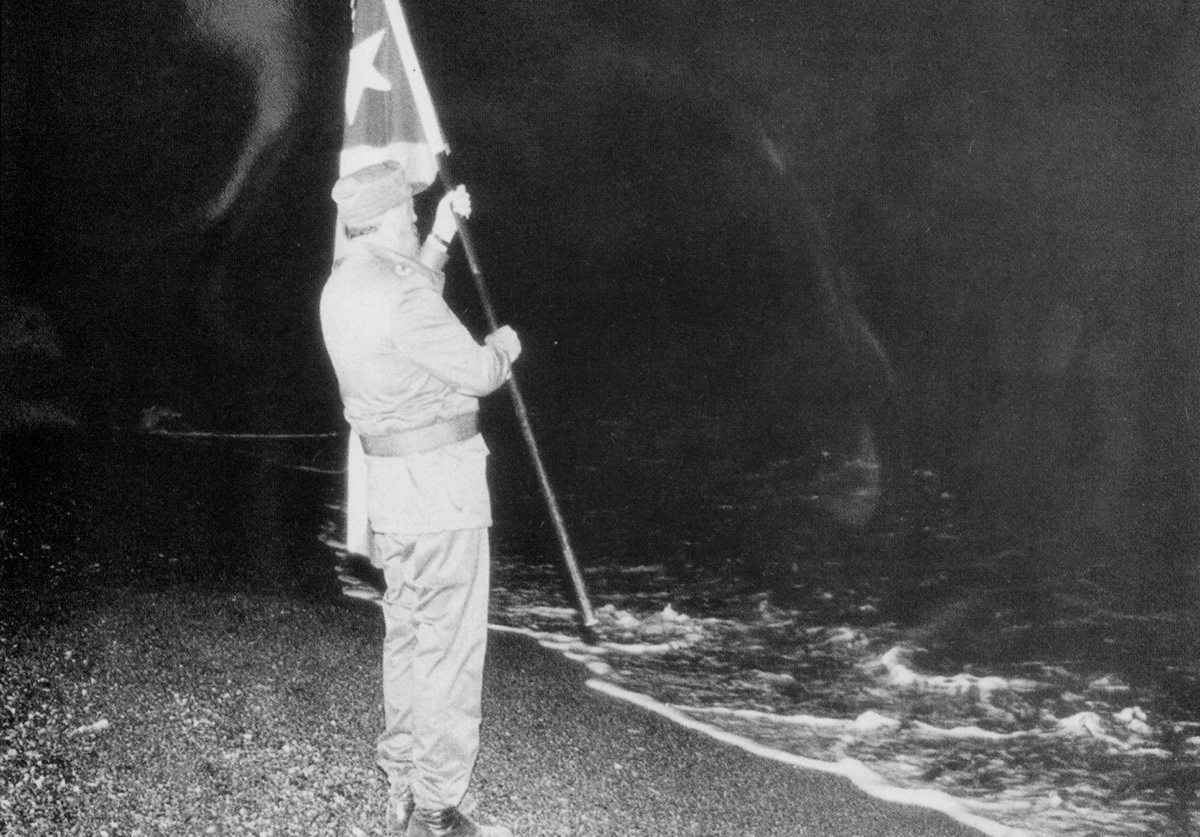
Fidel Castro on the beach at Playitas, 1995.
Years later, when "what to many
contemporaries seemed beyond
belief," had already occurred, when the Revolution had triumphed
and been consolidated, Fidel retraces one of the central ideas of
that letter. Cintio Vitier reminds us of it in analyzing "that
faith nourished by analysis" which is "contagious, irradiating
and attracts with the moral magnetism of its heroism," which is
giving rise to the renewed miracle of unity:" and everything that
seemed impossible -- Fidel himself would say so on July 26, 1971
-- was possible."[15]
Faith and analysis, history and futurity: Fidel's
insistence
on not losing the thread, on continuity, on dialogue with the
founders of the nation, looks to the past, yes; but is
relentlessly oriented to the future. The imagined Cuba which is
anticipated and sketched out between advances and setbacks, which
is seen more or less clearly, is always however there, ebbing or
flowing, like Lezama's potens.
Poets
generally capture / the past
/ vague and nostalgic / or the immediate present with its subtle
fires and reverberations, Miguel Barnet reminds us in his poem
"Fidel": But how difficult it is to
capture the future / and
locate it forever / in the lives of all poets, / of all
men.[16]
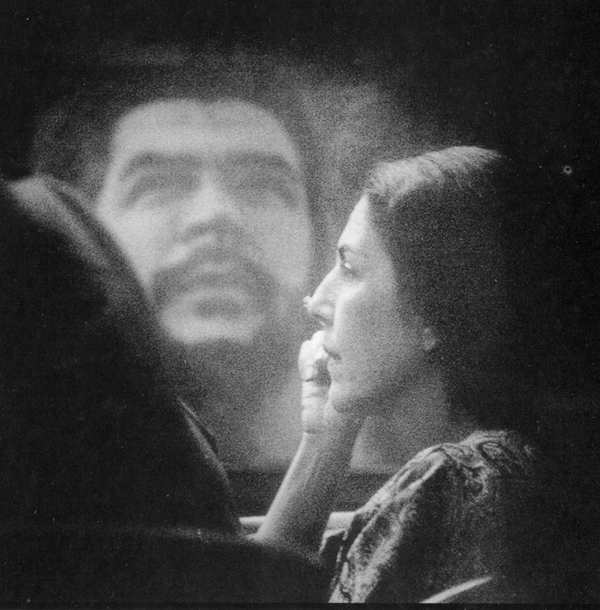 History and its influence
on what is created, the
reverberations of the present, the laborious shaping of the
future: references that in a revolution are juxtaposed and that
come together in an unexpected way, and fertilize one another,
and give rise to the legend that invents another space and
another temporality. Here there are photos that allow us to
discover the transfiguration of reality into mythology. They are
truly miraculous photos, because they caught a key moment of that
indefinable course: the environment and characters go about
acquiring a relief that no longer conforms to historical
objectivity, but to another moment, while contours are blurred
and the scene moves beyond dates and calendars, and begins to
enter a mythical time. Che's face with his beret and long hair,
and looking nowhere, or into the future, who knows, that Korda
captured during an event in 1960, occupies a place of honour
among the essential images of the twentieth century, among those
that will need scholars of the next millennium to understand this
shattered century a bit: it is one of the contributions made by
Cuban photographers to universal symbolic heritage, to the memory
of all those who in one way or another have clung to the idea of
emancipation. History and its influence
on what is created, the
reverberations of the present, the laborious shaping of the
future: references that in a revolution are juxtaposed and that
come together in an unexpected way, and fertilize one another,
and give rise to the legend that invents another space and
another temporality. Here there are photos that allow us to
discover the transfiguration of reality into mythology. They are
truly miraculous photos, because they caught a key moment of that
indefinable course: the environment and characters go about
acquiring a relief that no longer conforms to historical
objectivity, but to another moment, while contours are blurred
and the scene moves beyond dates and calendars, and begins to
enter a mythical time. Che's face with his beret and long hair,
and looking nowhere, or into the future, who knows, that Korda
captured during an event in 1960, occupies a place of honour
among the essential images of the twentieth century, among those
that will need scholars of the next millennium to understand this
shattered century a bit: it is one of the contributions made by
Cuban photographers to universal symbolic heritage, to the memory
of all those who in one way or another have clung to the idea of
emancipation.
Without a doubt the profile of Celia Sánchez,
accentuated by a line of light, that cuts across another photo in the
background, of Che, something that is veiled in death, belongs in a
series where saga and history merge: the heroine who
lives and works among us, the living legend, is superimposed on
the legend of the hero assassinated in Bolivia a few months
before Osvaldo Salas created the double homage with his lens. For
a long time already Celia Sánchez had been "Celia" to the
people;
simply "Celia." She was already myth and reality, a myth and a
palpable creation, and the people imagined her as a guardian
angel of Cuba, of Fidel, of the Revolution. Atheists and
believers prayed for her, each in their own way, and felt her
very close to their large and small problems, like an older
sister, or as an irreplaceable friend who cares for and feeds the
sick and the children. In Salas' Celia that and more is said,
without the need for words, and much better than anything that
could be said in words.
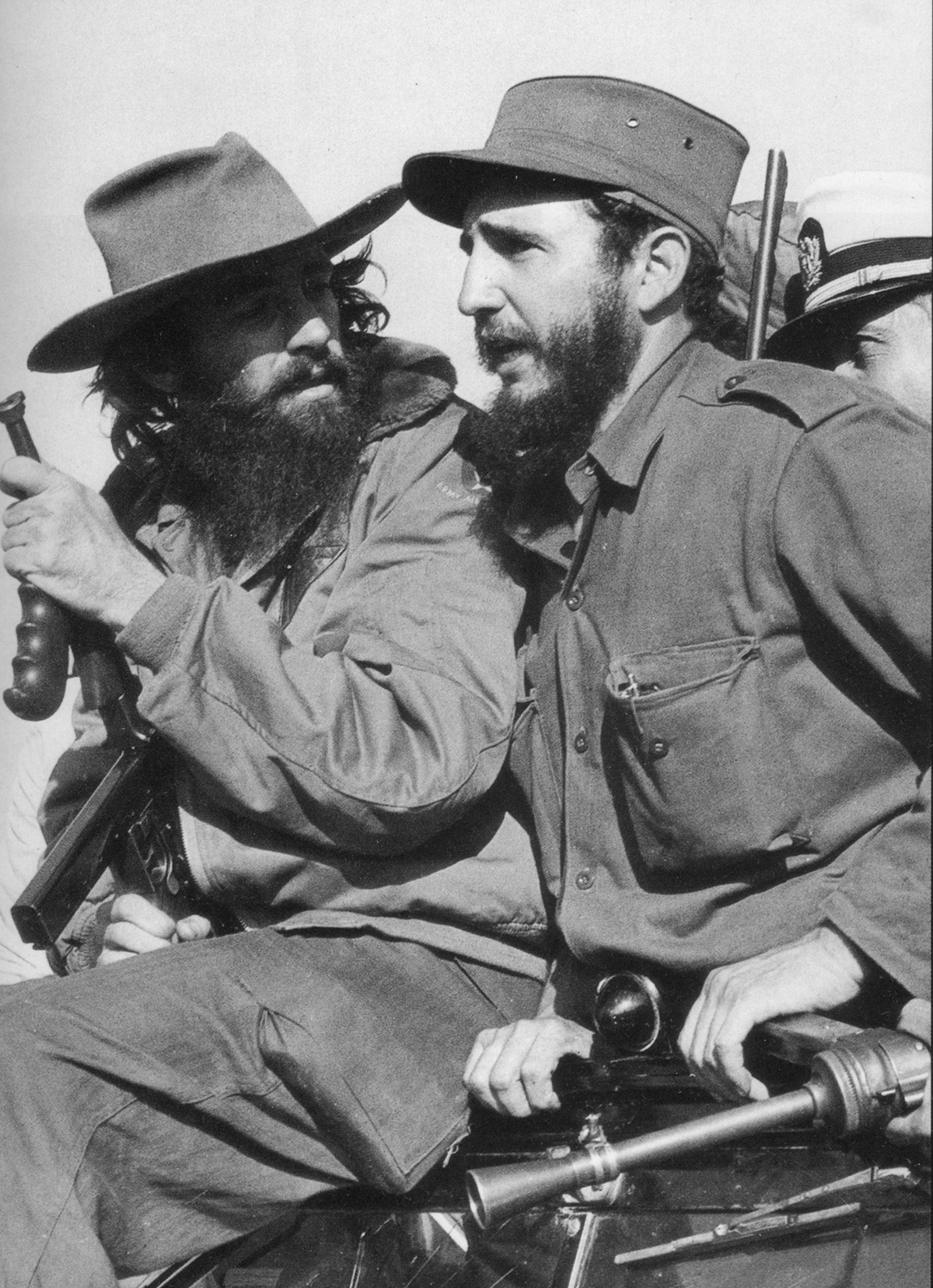 Camilo Cienfuegos, simply
"Camilo," like "Celia," was another
of the myths that immediately took root in the popular
consciousness. On October 28, 1959, just ten months after the
revolutionary triumph, he disappeared suddenly at sea, and left
us with a void, a scar. He is there, in some of the most
legendary photos: in May 1957, in the Sierra, with Fidel, Raúl,
Celia, Almeida; then on January 8, 1959, the only year that he
was known and loved by all Cubans, at Fidel's arrival in Havana;
the same January 8, a few hours later, presiding over the
ceremony in Columbia [Camp Columbia, a military complex near
Havana, originally established as a U.S. base in 1899 -- TML Ed.
Note] during which several pigeons flew up to the podium and
one perched on Fidel's shoulder, which atheists saw as a symbol,
and believers as a sign from God or from the gods; and on March
10, bringing down Columbia's military walls, and in September,
with Raúl and Hart, in the handover of the military
installation,
now converted to a school, to the Ministry of Education; and at
the front of the cavalry on July 26, sharing, between the riders
and flags, a laughing comment with the bearded man riding to his
right. With that comment and the smiles of Camilo and the
"bearded man" we detect the presence in this epic of the joking,
humour, teasing, the Cuban smile, the smile of the militiaman at
his wedding, the smile of the black cane cutter (even blacker
because he has been cutting burnt cane) that suddenly breaks into
that hearty, unrestrained, purifying laugh which has served us so
well against the impossible. Camilo Cienfuegos, simply
"Camilo," like "Celia," was another
of the myths that immediately took root in the popular
consciousness. On October 28, 1959, just ten months after the
revolutionary triumph, he disappeared suddenly at sea, and left
us with a void, a scar. He is there, in some of the most
legendary photos: in May 1957, in the Sierra, with Fidel, Raúl,
Celia, Almeida; then on January 8, 1959, the only year that he
was known and loved by all Cubans, at Fidel's arrival in Havana;
the same January 8, a few hours later, presiding over the
ceremony in Columbia [Camp Columbia, a military complex near
Havana, originally established as a U.S. base in 1899 -- TML Ed.
Note] during which several pigeons flew up to the podium and
one perched on Fidel's shoulder, which atheists saw as a symbol,
and believers as a sign from God or from the gods; and on March
10, bringing down Columbia's military walls, and in September,
with Raúl and Hart, in the handover of the military
installation,
now converted to a school, to the Ministry of Education; and at
the front of the cavalry on July 26, sharing, between the riders
and flags, a laughing comment with the bearded man riding to his
right. With that comment and the smiles of Camilo and the
"bearded man" we detect the presence in this epic of the joking,
humour, teasing, the Cuban smile, the smile of the militiaman at
his wedding, the smile of the black cane cutter (even blacker
because he has been cutting burnt cane) that suddenly breaks into
that hearty, unrestrained, purifying laugh which has served us so
well against the impossible.
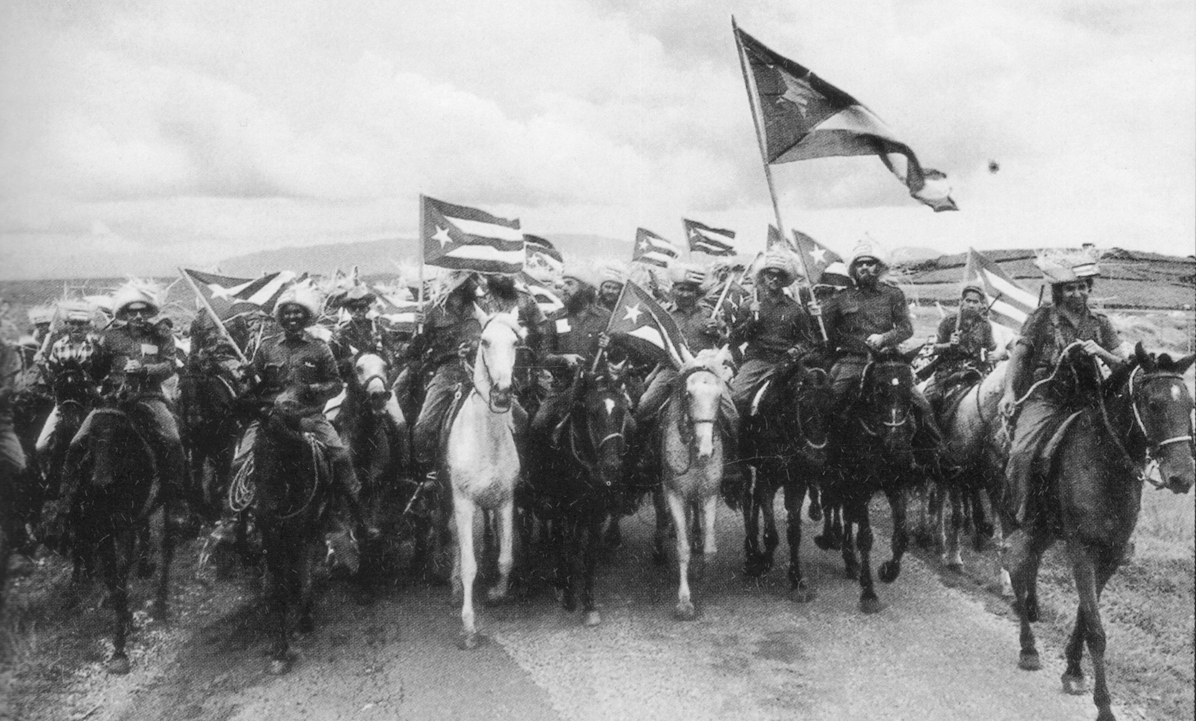
Camilo, Celia, Che, Roa, Haydée, Fidel,
Raúl, and the
countless unknown, vibrant characters who fill this book:
history, myth, pregnant and intense days, bright and sad days, spells
decapitated, dangers, principles and Cuban laughter, the dialogue
in the Plaza of the two tuning forks, and a stubborn quixotism
that keeps going and does not faint, and opens airways for the
homeland and for "other lands." The never-ending feeling that
makes the impossible possible, the faith nourished by analysis
that takes no repose, and spreads, radiates, attracts with
heroism's moral magnetism, and rescues the ring lost in the
pond. The future caught and placed forever in the lives of
all men, and all the still unfilled days that we will see burn.
In
a
hundred
images
we
travel
through
the framework of a Revolution that
shattered all manuals, set squares and dogmas, that was able to
give the lie to the Plattists, to the theorists of the "objective
and subjective conditions," to priests, barbers and bachelors, to
the prophets of doom, the nephews of Scrooge McDuck, to those who
accused Martí of being "crazy" and "utopian," in whom "the habit
of servility" is so ingrained that "it leads them to presume the
impotence they recognize in themselves resides in everyone
else."[17]
 Pedro Álvarez Tabio
is to be congratulated for his work of
searching and selecting, for offering us such a complete, such an
impactful visual panorama of our great history and at the same
time (how can it be avoided) our personal history, which have
been and are one and the same. In this book Cubans of all ages
will become reacquainted with what is purest and most dignified
in ourselves. In many, memories of lived moments will be sparked
and others who are younger can share in them and appropriate
those memories and will feel "their blood boil, full of faith in
our kind" if they examine these photos "with the soul of
guerrillas" and take in the exhibition of the hundred images like
the combatants of July 26 read the Chronicles
of Miró Argenter.
Thanks are also due of course to artists such as Korda, Corrales
and Salas, who admirably combined talent and a vocation for
testimony in the best works collected here, and to all the Cuban
photographers who have perpetuated such vigorous fragments of
life, reality and legend. Thanks to them we are able to view this
gallery from the present and admire all over again the epic scale
of the Cuban struggle against the impossible, the stature of our
heroes, and of the many, many men and women, from three or four
generations, who together raised the island's resistance,
its moral integrity, its obstinacy, its capacity to repeat the No
of Maceo, of Martí, of Fidel. Pedro Álvarez Tabio
is to be congratulated for his work of
searching and selecting, for offering us such a complete, such an
impactful visual panorama of our great history and at the same
time (how can it be avoided) our personal history, which have
been and are one and the same. In this book Cubans of all ages
will become reacquainted with what is purest and most dignified
in ourselves. In many, memories of lived moments will be sparked
and others who are younger can share in them and appropriate
those memories and will feel "their blood boil, full of faith in
our kind" if they examine these photos "with the soul of
guerrillas" and take in the exhibition of the hundred images like
the combatants of July 26 read the Chronicles
of Miró Argenter.
Thanks are also due of course to artists such as Korda, Corrales
and Salas, who admirably combined talent and a vocation for
testimony in the best works collected here, and to all the Cuban
photographers who have perpetuated such vigorous fragments of
life, reality and legend. Thanks to them we are able to view this
gallery from the present and admire all over again the epic scale
of the Cuban struggle against the impossible, the stature of our
heroes, and of the many, many men and women, from three or four
generations, who together raised the island's resistance,
its moral integrity, its obstinacy, its capacity to repeat the No
of Maceo, of Martí, of Fidel.
Havana, July 1996
Notes
1. Nicolás Guillén: "Tiempos de
victoria y lucha," Lunes de Revolución, January 4, 1960. In: Prosa de prisa, Editorial Arte y Literatura,
Havana, 1975, t. II, p.
265.
2. Ernesto Che Guevara: "El socialismo
y el hombre en Cuba" (text addressed in 1965 to Carlos Quijano,
editor of Marcha, Montevideo). In: Revolución,
letras,
arte,
Editorial
Letras
Cubanas, Havana, 1980, p.
36.
3. Ernesto Che Guevara: "Carta a sus
padres." In: Obras 1957-1967,
Casa de las Américas, Havana,
1970, II, p. 693.
4. Cintio Vitier: Ese
sol
del
mundo
moral, Siglo XXI
Editores, México, 1975, p.
67.
5. Cronología:
25 años de
Revolución (1959-1983), Editora
Política, Havana,, 1987, p. 24.
6. José Lezama Lima: "A partir de la
poesía"
(1960). In: La
cantidad hechizada, Ediciones Unión, Havana, 1970, pp.
50-51. In
"El 26 de Julio: imagen y posibilidad" (La Gaceta de Cuba,
November-December 1968), states that the assault on the Moncada
"was not a failure, it was a litmus test of the possibility and
the image of our historical counterpoint, near death, the
greatest test, as it had to be...." The Cuban, he said, "had lost
the profound meaning of his symbols [...]. But July 26 broke the
infernal spells, brought joy, then raised the time of the image
like a polyhedron in the light,..." In: Imagen y posibilidad, Editorial Letras Cubanas,
Havana, 1981, pp. 20-21.
7. Nicolás Guillén: "La sangre numerosa."
In: Poesía
completa, Editorial Letras Cubanas, Havana, 1973, II, p. 143:
When with blood he writes / FIDEL this soldier who dies for his
homeland...
8. Roberto Fernandez Retamar: "Sonata
para pasar esos días y piano" (Poesia reunida, 1966). In: Palabra
de mi pueblo, Editorial
Letras Cubanas, Havana, 1989, p. 87.
9. Ernesto Che Guevara: "Carta a
Fidel." In: Obras..., ed.
cit., pp. 697-698.
10. Statement by Fidel at the tenth
regular session of the National Assembly of People's Power, on July 3,
1986. Version published in Granma,
on
July
4,
and
reproduced
in
Cuba Socialista,
Sept-Oct
1986, p. 124. The above quotations
are taken from the number of Cuba Socialista, where Fidel's major
interventions "related to the process of rectification of errors
and negative tendencies made in meetings and events held between April
19 and July 26" are collected.
11. Fidel Castro: Socialismo,
ciencia
del
ejemplo (booklet), Editora Política, Havana, 1989, p.
30.
12. Roberto Fernandez Retamar: "Que veremos arder"
(1970). In: Palabra de mi pueblo,
ed.
cit.,
p.
122.
The
heroes
of
Moncada
and
the
Sierra
had
no
names,
or
at
least
their
names
/
No
one
knew.
The
dates
filled
/
were
empty
as
an
empty
house
...
/
Now, those who do not have names, / or whose names
nobody knows yet, / prepare flares in the shadows / empty dates to see
burning.
13. José Martí: "Carta a Manuel
Mercado," May 18, 1895. In: Obras
completas, Editorial
Nacional de Cuba, Havana, 1963, t. XX, p. 162.
14. Letter quoted by Mario Menda: La
prisión fecunda, Editora Política, Havana, 1980,
p. 34.
15. Cintio Vitier: Ese
sol..., ed.
cit., pp. 180-181.
16. Miguel Barnet: "Fidel" (Carta de
noche 1983). In: Con pies de gato,
Ediciones
Unión,
Havana,
1993,
p.
159.
17. José Martí: "El remedio
anexionista," Patria, New York, July 2, 1892. In: Obras
completas, ed. cit., t. 11, p. 49.

PREVIOUS
ISSUES | HOME
Website: www.cpcml.ca
Email: editor@cpcml.ca
|





 The Korda photo titled El
Quijote de la farola [Quixote of
the Street Lamp] picks up a scene from July 26, 1959, and tells us
something more. About two months earlier, in La Plata, in the
Sierra Maestra, Fidel and the Council of Ministers signed the
Agrarian Reform Law, and now the first mass rally to commemorate
the assault on the Moncada has been organized. Havana and
Revolution Square are filled with campesinos who have come from
all over the island. As in the best of our hundred images, the
Quixote in the straw hat who reigns above the crowd with his
gangly, lanky figure, half-smoked cigar and the expression of one
who lives in harmony with himself and his destiny, draws us to
the specific circumstances (the gathering of peasants, the
Agrarian Reform) and at the same time conjures up a metaphor that
goes beyond the situation and the characters photographed.
The Korda photo titled El
Quijote de la farola [Quixote of
the Street Lamp] picks up a scene from July 26, 1959, and tells us
something more. About two months earlier, in La Plata, in the
Sierra Maestra, Fidel and the Council of Ministers signed the
Agrarian Reform Law, and now the first mass rally to commemorate
the assault on the Moncada has been organized. Havana and
Revolution Square are filled with campesinos who have come from
all over the island. As in the best of our hundred images, the
Quixote in the straw hat who reigns above the crowd with his
gangly, lanky figure, half-smoked cigar and the expression of one
who lives in harmony with himself and his destiny, draws us to
the specific circumstances (the gathering of peasants, the
Agrarian Reform) and at the same time conjures up a metaphor that
goes beyond the situation and the characters photographed.

 "For our people nothing is
impossible anymore," said Fidel,
in front of the Presidential Palace, January 20, 1961, in
greeting the militias on their return to civilian life after a
massive mobilization. In a similar event, the same day, in
Santiago de Cuba, Raúl declared: "We destroyed the myth that
without the Americans we would die of hunger."[5]
While these events are
being
celebrated in Havana and Santiago, the last U.S. diplomats are
leaving for home, after the break in relations, their withdrawal
reaffirming that indeed nothing is impossible anymore; the evil
myths have been smashed: geographic fatalism, the laws of
annexationist gravitation, the "infernal spells."
"For our people nothing is
impossible anymore," said Fidel,
in front of the Presidential Palace, January 20, 1961, in
greeting the militias on their return to civilian life after a
massive mobilization. In a similar event, the same day, in
Santiago de Cuba, Raúl declared: "We destroyed the myth that
without the Americans we would die of hunger."[5]
While these events are
being
celebrated in Havana and Santiago, the last U.S. diplomats are
leaving for home, after the break in relations, their withdrawal
reaffirming that indeed nothing is impossible anymore; the evil
myths have been smashed: geographic fatalism, the laws of
annexationist gravitation, the "infernal spells."







 Two of these hundred images
were taken during a ceremony in
Camagüey: the celebration of July 26th in 1989. It had been
drizzling the whole time (dark drops are seen on Fidel's uniform
and some umbrellas protrude from the hushed crowd standing in
rows, listening attentively to the speech), and in the
background, once again, the statue of Martí, on a billboard,
speaking about "our morality and our honour." It was not just
another ceremony: it came at a decisive moment in the history of
the century. Bush had just held a triumphal tour with a visit to
Poland and Hungary where the forces of capitalist restoration
already had decisive weight; in the USSR the so-called reformers
were consolidating their positions, while the national and
inter-ethnic contradictions along with other internal tensions
were sharpening; the Empire and reaction were organizing the
funeral of socialism, in the midst of an overpowering chorus that was
joined by opportunists and repenters.
Two of these hundred images
were taken during a ceremony in
Camagüey: the celebration of July 26th in 1989. It had been
drizzling the whole time (dark drops are seen on Fidel's uniform
and some umbrellas protrude from the hushed crowd standing in
rows, listening attentively to the speech), and in the
background, once again, the statue of Martí, on a billboard,
speaking about "our morality and our honour." It was not just
another ceremony: it came at a decisive moment in the history of
the century. Bush had just held a triumphal tour with a visit to
Poland and Hungary where the forces of capitalist restoration
already had decisive weight; in the USSR the so-called reformers
were consolidating their positions, while the national and
inter-ethnic contradictions along with other internal tensions
were sharpening; the Empire and reaction were organizing the
funeral of socialism, in the midst of an overpowering chorus that was
joined by opportunists and repenters.




 History and its influence
on what is created, the
reverberations of the present, the laborious shaping of the
future: references that in a revolution are juxtaposed and that
come together in an unexpected way, and fertilize one another,
and give rise to the legend that invents another space and
another temporality. Here there are photos that allow us to
discover the transfiguration of reality into mythology. They are
truly miraculous photos, because they caught a key moment of that
indefinable course: the environment and characters go about
acquiring a relief that no longer conforms to historical
objectivity, but to another moment, while contours are blurred
and the scene moves beyond dates and calendars, and begins to
enter a mythical time. Che's face with his beret and long hair,
and looking nowhere, or into the future, who knows, that Korda
captured during an event in 1960, occupies a place of honour
among the essential images of the twentieth century, among those
that will need scholars of the next millennium to understand this
shattered century a bit: it is one of the contributions made by
Cuban photographers to universal symbolic heritage, to the memory
of all those who in one way or another have clung to the idea of
emancipation.
History and its influence
on what is created, the
reverberations of the present, the laborious shaping of the
future: references that in a revolution are juxtaposed and that
come together in an unexpected way, and fertilize one another,
and give rise to the legend that invents another space and
another temporality. Here there are photos that allow us to
discover the transfiguration of reality into mythology. They are
truly miraculous photos, because they caught a key moment of that
indefinable course: the environment and characters go about
acquiring a relief that no longer conforms to historical
objectivity, but to another moment, while contours are blurred
and the scene moves beyond dates and calendars, and begins to
enter a mythical time. Che's face with his beret and long hair,
and looking nowhere, or into the future, who knows, that Korda
captured during an event in 1960, occupies a place of honour
among the essential images of the twentieth century, among those
that will need scholars of the next millennium to understand this
shattered century a bit: it is one of the contributions made by
Cuban photographers to universal symbolic heritage, to the memory
of all those who in one way or another have clung to the idea of
emancipation. Camilo Cienfuegos, simply
"Camilo," like "Celia," was another
of the myths that immediately took root in the popular
consciousness. On October 28, 1959, just ten months after the
revolutionary triumph, he disappeared suddenly at sea, and left
us with a void, a scar. He is there, in some of the most
legendary photos: in May 1957, in the Sierra, with Fidel, Raúl,
Celia, Almeida; then on January 8, 1959, the only year that he
was known and loved by all Cubans, at Fidel's arrival in Havana;
the same January 8, a few hours later, presiding over the
ceremony in Columbia [Camp Columbia, a military complex near
Havana, originally established as a U.S. base in 1899 -- TML Ed.
Note] during which several pigeons flew up to the podium and
one perched on Fidel's shoulder, which atheists saw as a symbol,
and believers as a sign from God or from the gods; and on March
10, bringing down Columbia's military walls, and in September,
with Raúl and Hart, in the handover of the military
installation,
now converted to a school, to the Ministry of Education; and at
the front of the cavalry on July 26, sharing, between the riders
and flags, a laughing comment with the bearded man riding to his
right. With that comment and the smiles of Camilo and the
"bearded man" we detect the presence in this epic of the joking,
humour, teasing, the Cuban smile, the smile of the militiaman at
his wedding, the smile of the black cane cutter (even blacker
because he has been cutting burnt cane) that suddenly breaks into
that hearty, unrestrained, purifying laugh which has served us so
well against the impossible.
Camilo Cienfuegos, simply
"Camilo," like "Celia," was another
of the myths that immediately took root in the popular
consciousness. On October 28, 1959, just ten months after the
revolutionary triumph, he disappeared suddenly at sea, and left
us with a void, a scar. He is there, in some of the most
legendary photos: in May 1957, in the Sierra, with Fidel, Raúl,
Celia, Almeida; then on January 8, 1959, the only year that he
was known and loved by all Cubans, at Fidel's arrival in Havana;
the same January 8, a few hours later, presiding over the
ceremony in Columbia [Camp Columbia, a military complex near
Havana, originally established as a U.S. base in 1899 -- TML Ed.
Note] during which several pigeons flew up to the podium and
one perched on Fidel's shoulder, which atheists saw as a symbol,
and believers as a sign from God or from the gods; and on March
10, bringing down Columbia's military walls, and in September,
with Raúl and Hart, in the handover of the military
installation,
now converted to a school, to the Ministry of Education; and at
the front of the cavalry on July 26, sharing, between the riders
and flags, a laughing comment with the bearded man riding to his
right. With that comment and the smiles of Camilo and the
"bearded man" we detect the presence in this epic of the joking,
humour, teasing, the Cuban smile, the smile of the militiaman at
his wedding, the smile of the black cane cutter (even blacker
because he has been cutting burnt cane) that suddenly breaks into
that hearty, unrestrained, purifying laugh which has served us so
well against the impossible.
 Pedro Álvarez Tabio
is to be congratulated for his work of
searching and selecting, for offering us such a complete, such an
impactful visual panorama of our great history and at the same
time (how can it be avoided) our personal history, which have
been and are one and the same. In this book Cubans of all ages
will become reacquainted with what is purest and most dignified
in ourselves. In many, memories of lived moments will be sparked
and others who are younger can share in them and appropriate
those memories and will feel "their blood boil, full of faith in
our kind" if they examine these photos "with the soul of
guerrillas" and take in the exhibition of the hundred images like
the combatants of July 26 read the Chronicles
of Miró Argenter.
Thanks are also due of course to artists such as Korda, Corrales
and Salas, who admirably combined talent and a vocation for
testimony in the best works collected here, and to all the Cuban
photographers who have perpetuated such vigorous fragments of
life, reality and legend. Thanks to them we are able to view this
gallery from the present and admire all over again the epic scale
of the Cuban struggle against the impossible, the stature of our
heroes, and of the many, many men and women, from three or four
generations, who together raised the island's resistance,
its moral integrity, its obstinacy, its capacity to repeat the No
of Maceo, of Martí, of Fidel.
Pedro Álvarez Tabio
is to be congratulated for his work of
searching and selecting, for offering us such a complete, such an
impactful visual panorama of our great history and at the same
time (how can it be avoided) our personal history, which have
been and are one and the same. In this book Cubans of all ages
will become reacquainted with what is purest and most dignified
in ourselves. In many, memories of lived moments will be sparked
and others who are younger can share in them and appropriate
those memories and will feel "their blood boil, full of faith in
our kind" if they examine these photos "with the soul of
guerrillas" and take in the exhibition of the hundred images like
the combatants of July 26 read the Chronicles
of Miró Argenter.
Thanks are also due of course to artists such as Korda, Corrales
and Salas, who admirably combined talent and a vocation for
testimony in the best works collected here, and to all the Cuban
photographers who have perpetuated such vigorous fragments of
life, reality and legend. Thanks to them we are able to view this
gallery from the present and admire all over again the epic scale
of the Cuban struggle against the impossible, the stature of our
heroes, and of the many, many men and women, from three or four
generations, who together raised the island's resistance,
its moral integrity, its obstinacy, its capacity to repeat the No
of Maceo, of Martí, of Fidel.

 Dear people of Cuba:
Dear people of Cuba: On 28 and 29 November, from 09:00
to 22:00, at
locations to
be notified at the opportune time, in every city and town
including the capital Havana, every Cuban will have the
possibility of paying homage and signing the solemn oath to
fulfill the Concept of Revolution expressed by our historical
leader on the first of May of 2000, as expression of our will to
continue his ideas and those of our Socialism.
On 28 and 29 November, from 09:00
to 22:00, at
locations to
be notified at the opportune time, in every city and town
including the capital Havana, every Cuban will have the
possibility of paying homage and signing the solemn oath to
fulfill the Concept of Revolution expressed by our historical
leader on the first of May of 2000, as expression of our will to
continue his ideas and those of our Socialism.
 Fidel is an integral member
of the pantheon of champions of
the people who made an indelible contribution to the global
struggle for liberation and emancipation.
Fidel is an integral member
of the pantheon of champions of
the people who made an indelible contribution to the global
struggle for liberation and emancipation.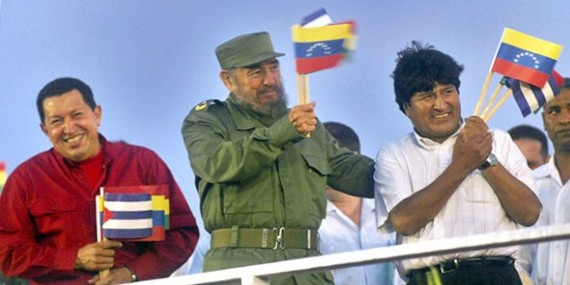
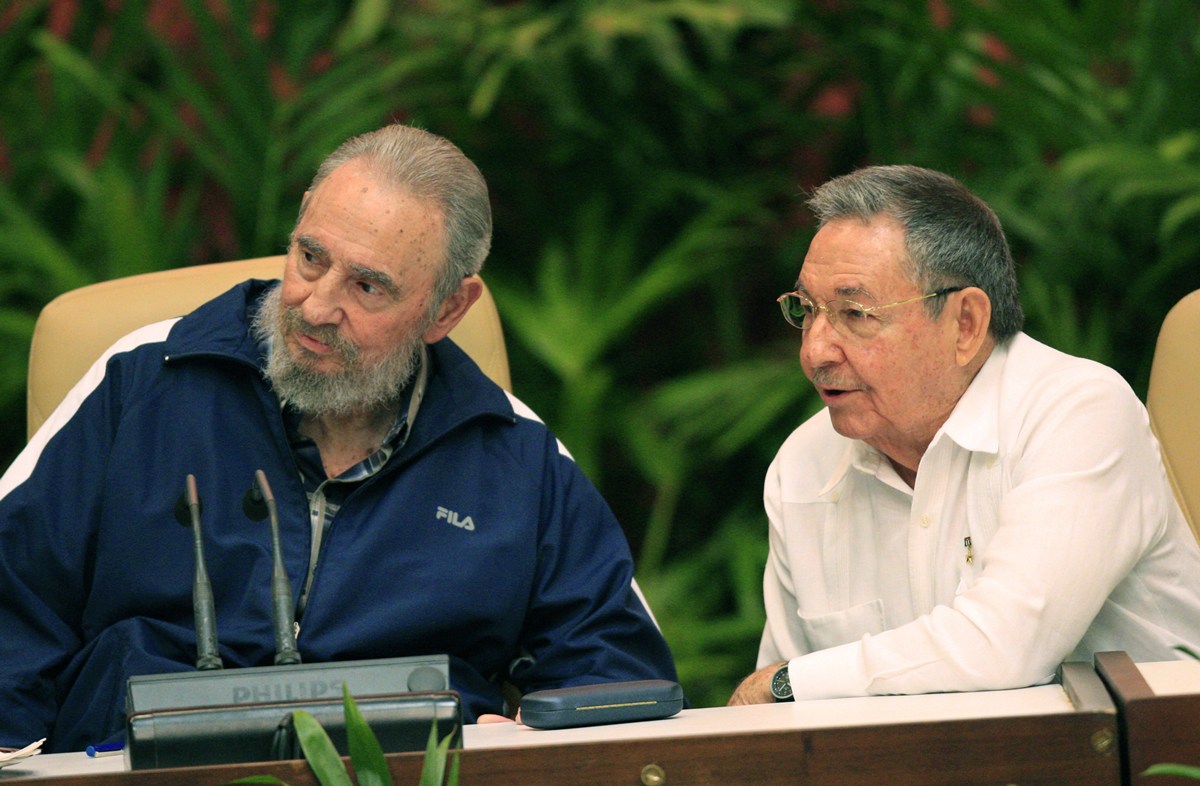

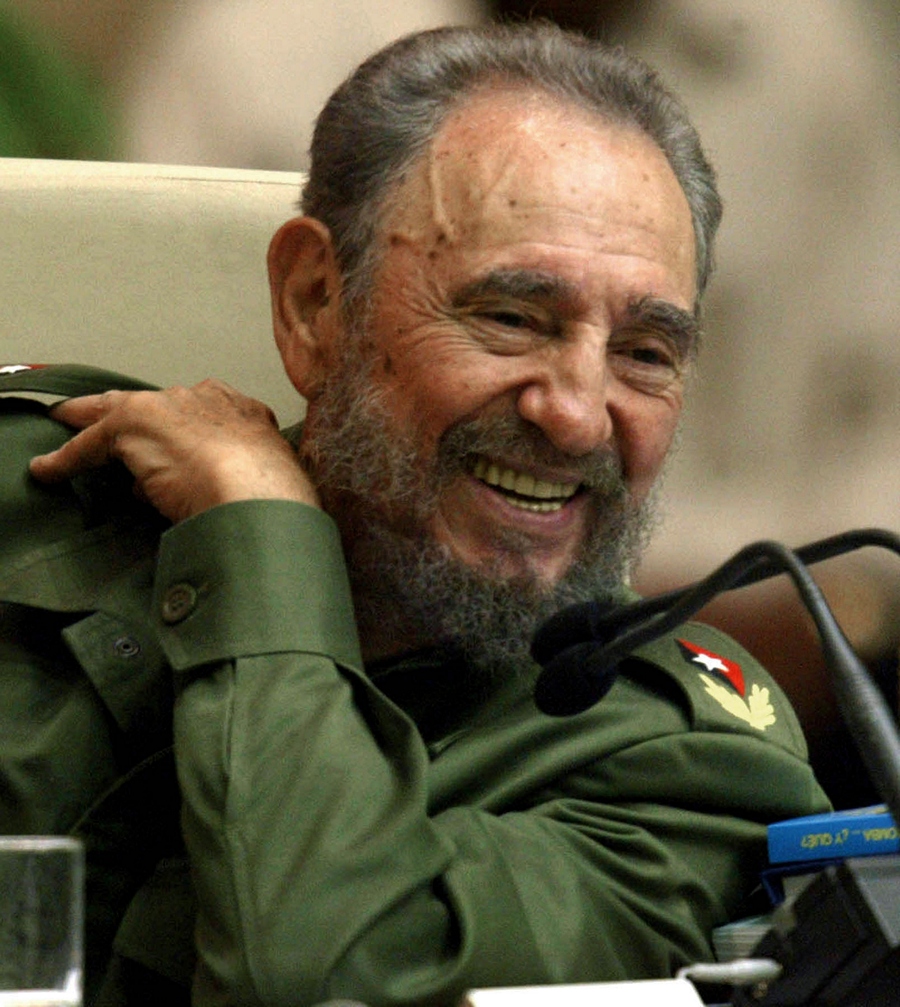
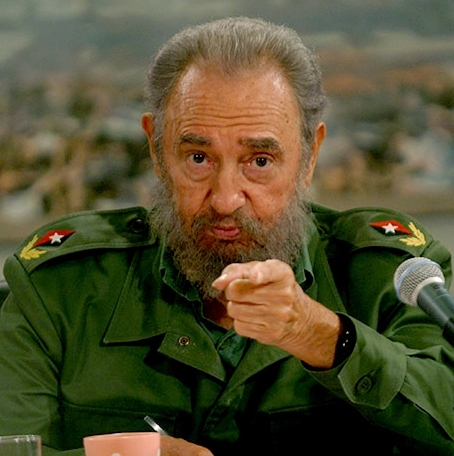

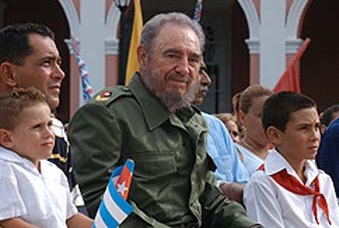
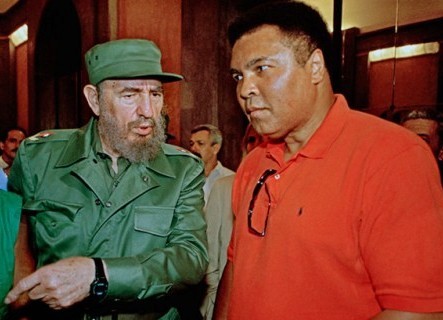
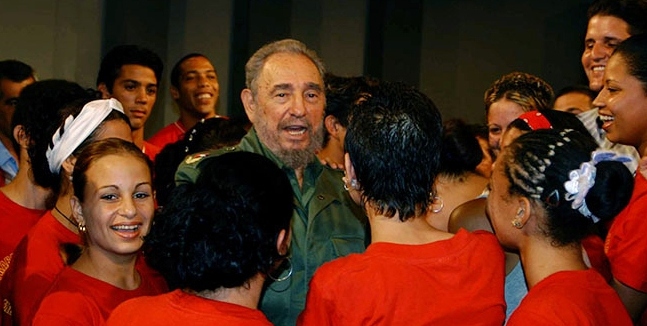
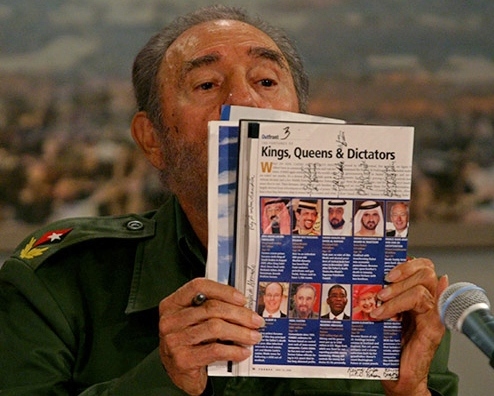
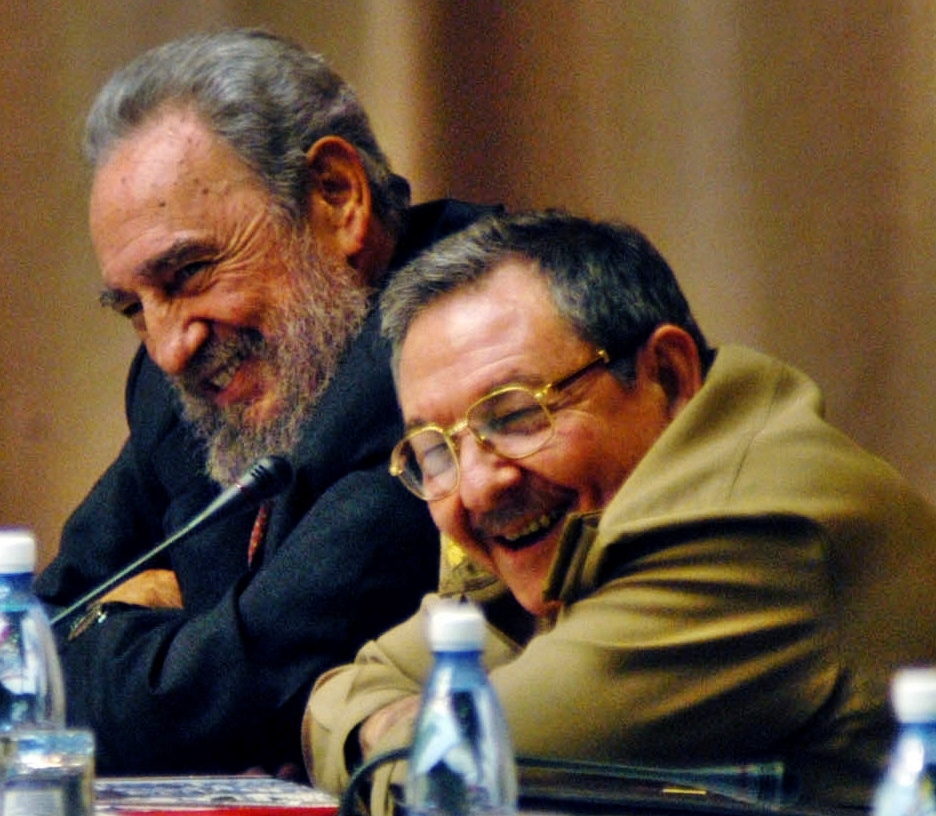
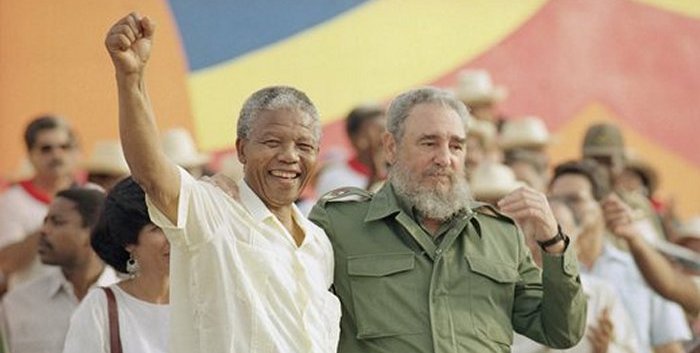

 Dear friends, and I say
"dear
friends" with great pleasure! It is difficult to summarize or
make a synthesis of the contents of these conference days, but I
can make some comments.
Dear friends, and I say
"dear
friends" with great pleasure! It is difficult to summarize or
make a synthesis of the contents of these conference days, but I
can make some comments. The United States does not trade with markets
that
trade with
Cuba, but it does want to export ideas, and the worst ideas; it
does not export foodstuffs to Cuba, it does not export medicines,
technology or machinery to Cuba, but it does export incredible
quantities of ideas. What is happening now is that before the
ideas market was much wider, and it exported many ideas to the
socialist bloc, to the former Soviet Union and other countries;
these days the United States reserves its counter-revolutionary
ideas for us, from a vast and powerful stock of enormous,
infinite mass media programming. This trade is a one-way trade as
we do not have that kind of mass media, those enormous
communications systems which cost billions, ten of billions of
dollars every year, which we are condemned to receive, not to
exchange.
The United States does not trade with markets
that
trade with
Cuba, but it does want to export ideas, and the worst ideas; it
does not export foodstuffs to Cuba, it does not export medicines,
technology or machinery to Cuba, but it does export incredible
quantities of ideas. What is happening now is that before the
ideas market was much wider, and it exported many ideas to the
socialist bloc, to the former Soviet Union and other countries;
these days the United States reserves its counter-revolutionary
ideas for us, from a vast and powerful stock of enormous,
infinite mass media programming. This trade is a one-way trade as
we do not have that kind of mass media, those enormous
communications systems which cost billions, ten of billions of
dollars every year, which we are condemned to receive, not to
exchange.

